
The Project Gutenberg EBook of The Young and Field Literary Readers, Book 2, by
Ella Flagg Young and Walter Taylor Field
This eBook is for the use of anyone anywhere at no cost and with
almost no restrictions whatsoever. You may copy it, give it away or
re-use it under the terms of the Project Gutenberg License included
with this eBook or online at www.gutenberg.org
Title: The Young and Field Literary Readers, Book 2
Author: Ella Flagg Young
Walter Taylor Field
Illustrator: Maginel Wright Enright
Release Date: December 26, 2011 [EBook #38412]
Language: English
Character set encoding: ISO-8859-1
*** START OF THIS PROJECT GUTENBERG EBOOK THE YOUNG AND FIELD LITERARY ***
Produced by Juliet Sutherland, Matthew Wheaton and the
Online Distributed Proofreading Team at http://www.pgdp.net

Book Two
BY
ELLA FLAGG YOUNG
Superintendent of the Chicago Public Schools
AND
WALTER TAYLOR FIELD
Author of "Fingerposts to Children's Reading," "Rome," Etc
Illustrated by Maginel Wright Enright
GINN AND COMPANY
BOSTON · NEW YORK · CHICAGO · LONDON
COPYRIGHT, 1916, BY ELLA FLAGG YOUNG
AND WALTER TAYLOR FIELD
ALL RIGHTS RESERVED
116.3
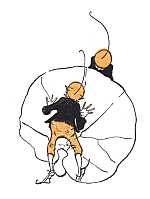
The Athenæum Press
GINN AND COMPANY · PROPRIETORS ·
BOSTON · U.S.A.
[3]
Dear Boys and Girls:
Do you like fairy stories?
You do not need to tell us.
We know you like them.
So we are going to give you some to read.
You may have heard some of these stories before, but not many of them.
Some have come from far across the sea, and some have come from our own country.
Mothers have told them to their children again and again, and children have never been tired of them.
We think you will like them, too.
[4]
The poems of Mr. Frank Dempster Sherman and Miss Abbie Farwell Brown are used by special arrangement with the Houghton Mifflin Company, publishers.
Acknowledgments are also due to the following publishers and authors for permission to use copyrighted material: to Charles Scribner's Sons for poems from Robert Louis Stevenson's "A Child's Garden of Verses" and Mrs. Mary Mapes Dodge's "Rhymes and Jingles"; to the Macmillan Company for poems from Christina Rossetti's "Sing Song"; to Little, Brown, and Company for poems from Mrs. Laura E. Richards's "In My Nursery"; to G. P. Putnam's Sons for the use of Sir George Webbe Dasent's version of the story "East of the Sun and West of the Moon," from "Popular Tales from the Norse," as the basis for our story of the same name; to the A. Flanagan Company and Miss Flora J. Cooke for the use of "The Rainbow Bridge," from Miss Cooke's "Nature Myths," in a similar way; to Miss Marion Florence Lansing for permission to adapt her dramatized Hindu Tale, "The Man's Boot," from "Quaint Old Stories," in our story "The Shoe"; to Mr. William Hawley Smith for permission to use his poem "A Child's Prayer."
[5]
English Fairy TalesPage
Childe Rowland11
Tom Tit Tot25
Poems by Christina Rossetti
Lambkins37
Ferry Me Across the Water38
Coral39
The Swallow40
Wrens and Robins41
Boats Sail on the Rivers42
Fables From Æsop
The Lion and the Mouse43
The Honest Woodcutter45
The Wolf and the Crane49
The Town Mouse and the Country Mouse51
The Wind and the Sun54
The Ant and the Dove56
The Lark and her Nest58
The Dog and his Shadow61
The Fox and the Grapes63
Poems by Mary Mapes Dodge
Four Little Birds64
In the Basket65
Cousin Jeremy66
Little Miss Limberkin66
Snowflakes67
Hollyhock68
German Fairy Tales
The Little Pine Tree69
The Faithful Beasts75
[6]
Poems by Robert Louis Stevenson
Where Go the Boats?85
At the Seaside87
Rain87
Autumn Fires88
The Wind89
Hindu Fables
The Timid Hares91
The Shoe97
The Camel and the Jackal102
Poems by Laura E. Richards
The Bumblebee106
Little Brown Bobby107
Jippy and Jimmy108
The Song of the Corn Popper109
A French Fairy Tale
The Fairy111
A Norse Folk Tale
East of the Sun and West of the Moon119
Poems by Abbie Farwell Brown
The Sailor135
A Music Box137
American Indian Legends
Little Scar-Face138
The Hunter who Forgot148
The Water Lily156
Russian Fables
Fortune and the Beggar160
The Spider and the Bee163
The Stone and the Worm165
The Fox in the Ice167
[7]
Poems by Frank Dempster Sherman
Clouds169
Ghost Fairies171
Daisies173
Old Greek Stories
The Sun, the Moon, and the Star Giant174
The Wind and the Clouds180
The Rainbow Bridge186
Poems Old and New
Thank You, Pretty CowJane Taylor 189
PlaygroundsLaurence Alma-Tadema 190
Sleep, Baby, SleepGerman Cradle Song 191
A Child's PrayerWilliam Hawley Smith 192
LISTS OF WORDS FOR PHONETIC DRILL193
LIST OF NEW WORDS ARRANGED BY LESSONS202
BOOK TWO
[10]
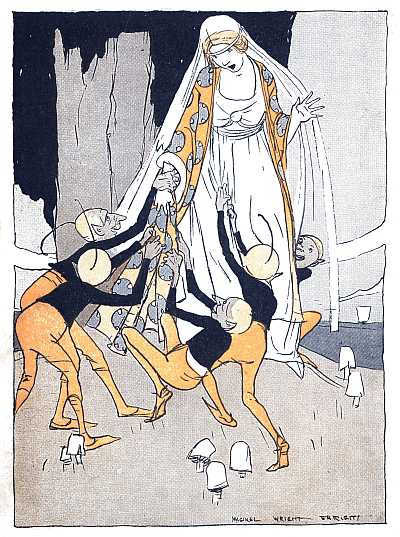
[11]

Once upon a time there was a little princess.
Her name was Ellen.
She lived with her mother the queen in a great house by the sea.
She had three brothers.
One day, as they were playing ball, one of her brothers threw the ball over the house.
Ellen ran to get it, but she did not come back.
[12]
The three brothers looked for her.
They looked and looked, but they could not find her.
Day after day went by.
At last the oldest brother went to a wise man and asked what to do.
"The princess is with the elves. She is in the Dark Tower," said the wise man.
"Where is the Dark Tower?" asked the oldest brother.
"It is far away," said the wise man. "You cannot find it."
"I can and I will find it. Tell me where it is," said the oldest brother.
The wise man told him, and the oldest brother set off at once.
The other brothers waited.
[13]
They waited long, but the oldest brother did not come back.
Then the next brother went to the wise man.
The wise man told him as he had told the oldest brother.
Then the next brother set out to find the Dark Tower.
The youngest brother waited.
He waited long, but no one came.
Now the youngest brother was called Childe Rowland.
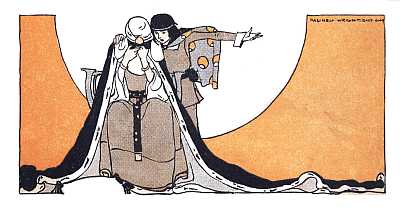
[14]
At last Childe Rowland went to his mother the queen and said:
"Mother, let me go and find the Dark Tower and bring home Ellen and my brothers."
"I cannot let you go. You are all that I have, now," said the queen.
But Childe Rowland asked again and again, till at last the queen said, "Go, my boy."
Then she gave him his father's sword, and he set out.
He went to the wise man and asked the way.
The wise man told him and said:
"I will tell you two things. One thing is for you to do, and one thing is for you not to do.
[15]
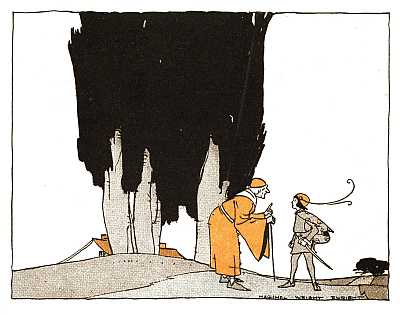
"The thing to do is this: When you get to the country of the elves, take hold of your father's sword, pull it out quickly, and cut off the head of any one who speaks to you, till you find the princess Ellen.
[16]
"The thing not to do is this: Bite no bit and drink no drop till you come back. Go hungry and thirsty while you are in the country of the elves."
Childe Rowland said the two things over and over, so that he should not forget.
Then he went on his way.
He went on and on and on, till he came to some horses with eyes of fire.
Then he knew he was in the country of the elves.
A man was with the horses.
"Where is the Dark Tower?" asked Childe Rowland.
"I do not know," said the man. "Ask the man that keeps the cows."
[17]

Childe Rowland thought of what the wise man had told him.
He pulled out his father's sword, and off went the man's head.
Then Childe Rowland went on and on, till he came to some cows with eyes of fire.
The man who kept the cows looked at Childe Rowland.
"Where is the Dark Tower?" asked Childe Rowland.
"I cannot tell. Ask the woman that keeps the hens," said the man.
Childe Rowland took the sword, and off went the man's head.
[18]
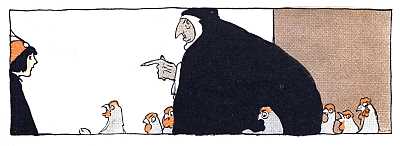
Then Childe Rowland went on and on, till he came to some hens with eyes of fire.
An old woman was with them.
"Where is the Dark Tower?" asked Childe Rowland.
"Go on and look for a hill," said the old woman. "Go around the hill three times. Each time you go around say:
When you have gone three times around, a door will open. Go in."
[19]
Childe Rowland did not like to cut off the head of the old woman, but he thought of what the wise man had told him.
So he took hold of the sword, and off went her head.
After this he went on and on and on, till he came to a hill.
He went three times around it, and each time he said:
When he had gone three times around, a door opened. In he went.
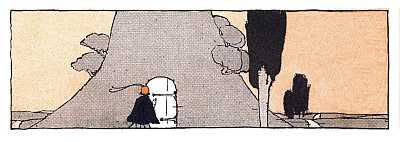
[20]
The door shut after him, and he was in the dark.
Soon he began to see a dim light.
It seemed to come from the walls.
He went down a long way, and at last he came to another door.
All at once it flew open, and he found himself in a great hall.
The walls were of gold and silver, and were hung with diamonds.
How the diamonds shone!
And there sat the princess Ellen in a great chair of gold, with diamonds all about her head.
When she saw Childe Rowland, she came to him and said:
"Brother, why are you here? If the king of the elves comes, it will be a sad day for you."
[21]
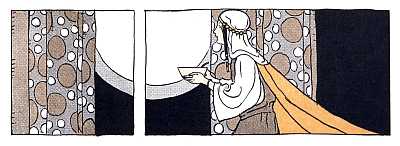
But this did not frighten Childe Rowland. He sat down and told her all that he had done.
She told him that the two brothers were in the tower.
The king of the elves had turned them into stone.
Soon Childe Rowland began to be very hungry, and asked for something to eat.
Ellen went out and soon came back with bread and milk in a golden bowl.
Childe Rowland took it and was about to eat.
[22]
All at once he thought of what the wise man had said.
So he threw the bowl down upon the floor, and said:
Then they heard a great noise outside, and some one cried out:
The door of the hall flew open and the king of the elves came in.
Childe Rowland took his sword.
They fought and they fought.
At last Childe Rowland beat the king of the elves down to the ground.
[23]
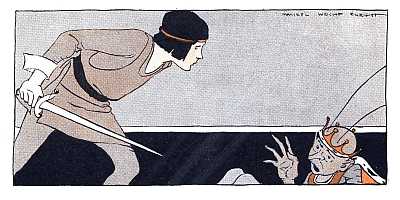
"Stop!" cried the king of the elves. "I have had enough."
"I will stop when you set free the princess Ellen and my brothers," said Childe Rowland.
"I will set them free," said the king.
He went at once to a cupboard and took out a blood-red bottle.
Out of this bottle he let a drop or two fall upon the eyes of the two brothers, and up they jumped.
[24]
Childe Rowland took the hand of his sister and went out of the door, and up the long way.
The two brothers went after them and left the king of the elves alone.
Then they came out from the hill and found their way back to their own country.
How glad the queen was!
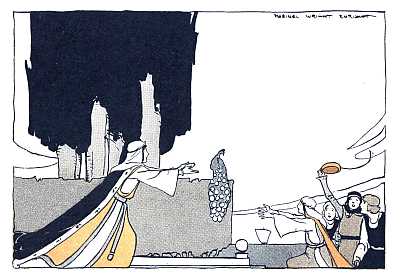
[25]
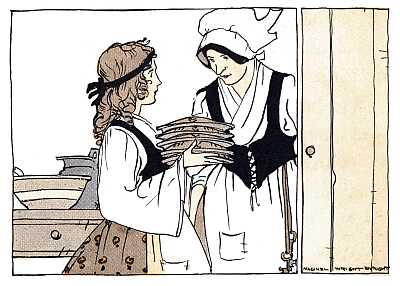
Once a woman made five pies.
When she had made them, she found that they were too hard.
So the woman said to her daughter:
"Put those pies into the cupboard and leave them there a little while and they'll come again."
She meant that they would get soft.
[26]
But the girl said to herself,
"Well, if they'll come again, I think I will eat them."
So she ate them all up.
At supper time the woman said,
"Daughter, get one of those pies. I think they must have come again."
The girl went to the cupboard and looked, but no pies were there.
Then she came back to her mother and said,
"No, they have not come again."
"Well, bring one," said the mother. "I want one for my supper."
"But I can't. They have not come."
"Yes, you can. Bring me one."
"But I ate them all up."
"What!" said the mother, "You bad, bad girl!"
[27]
The woman could not stop thinking about those five pies.
As she sat at the door spinning, she kept mumbling to herself:
The king was going by, and he heard the woman mumbling.
"What are you saying, woman?" asked the king.
The woman did not like to tell him about the pies, so she said:
"Well, well, well!" said the king, "I didn't know that any one could spin so much as that!"
"My daughter knows how to spin," said the woman.
[28]
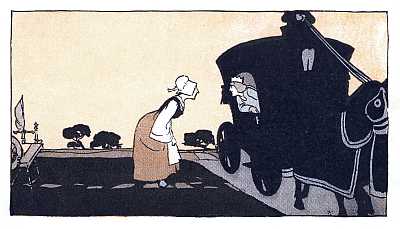
The king thought a little while.
Then he said: "I want a wife. If your daughter can spin as much as that, I will make her my wife. She shall have fine clothes, and for eleven months in every year she may do anything she wishes. But the last month of the year she must spin five skeins each day. If she doesn't, she must have her head cut off."
[29]
"Very well," said the woman.
She thought how fine it would be if her daughter should be the queen.
The girl could have a good time for eleven months, anyway, and there would surely be some way to get the skeins spun.
So the king took the girl away and made her queen.
For eleven months she had everything she could think of.
She had gold and silver and diamonds and fine clothes and good things to eat.
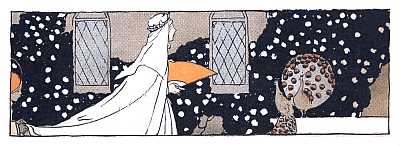
[30]
But when the last month of the year came, she began to think what she should do about those five skeins.
She did not have long to think, for the king took her into a room, all by herself, and said:
"Here is a spinning wheel, and here is a chair, and here is some flax.
"Now, my dear, sit down and spin five skeins before night, or off goes your head."
Then he turned and went out.
How frightened she was!
She could not spin.
She could only sit down and cry.
All at once there was a rap at the door.
[31]
She jumped up and opened it, and what should she see but a little black thing with a long tail!
"What are you crying about?" asked the little black thing.
"It would do no good to tell you," said the queen.
"How do you know that?" asked the little black thing, and he twirled his tail.
"Well, I will tell you," she said. And she told him all that the king had said to her.
"Then," said the little black thing, "I will come here to your window every morning and take some flax, and bring it back at night all spun.
"If you can guess my name, you shall pay nothing for my work.
[32]
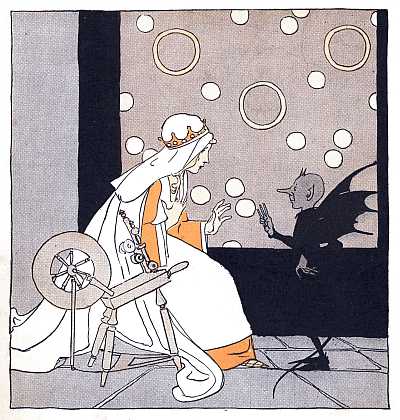
"You may try three times each night, when I bring back the skeins. But if you can't guess my name before the last day of the month, I will carry you off with me."
[33]
The queen thought that she could surely guess, so she said:
"Very well. Take the flax."
"Yes," said the little black thing, and my! how he twirled his tail!
That night he came back with five skeins of spun flax, but she could not guess his name.
So it went on day after day. Every night the little black thing brought five skeins, but she could not guess his name.
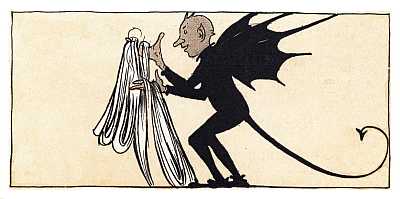
[34]
On the last day of the month the king came in to see her.
"You are doing well, my dear," said he.
"I think I shall not have to cut off your head, after all."
So he had a fine supper brought in, and they ate it together.
As they were eating, the king said:
"I was hunting to-day in the woods, and I heard a queer song. It came from a hole in the ground. I looked in, and there sat a little black thing with a long tail. He was spinning. He twirled his tail as he spun, and sang:
The queen at once jumped up and danced all around the table, but she said nothing.
The king thought she was glad because her spinning was done.
That night the little black thing brought the last five skeins of flax.
"Well," he said, "what is my name? You may guess three times more."
How he twirled his tail!
"Is it Jack?" she asked.
"No, it is not Jack," he said.
"Is it Tom?" she asked.
"No, it is not Tom."
You should have seen him laugh!
"One more guess; then I take you," said the little black thing, and he twirled his tail again.
This time the queen laughed.
[36]
She looked at him a long time and then said:
At that the little black thing gave a great cry, and away he flew, out into the dark.
The queen never saw him again.
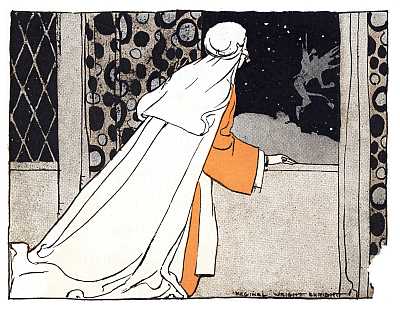
[37]
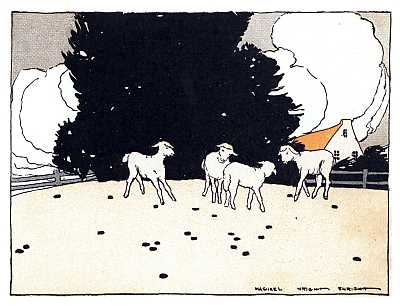

[39]
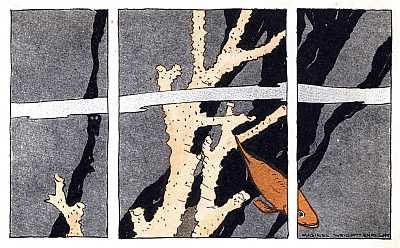
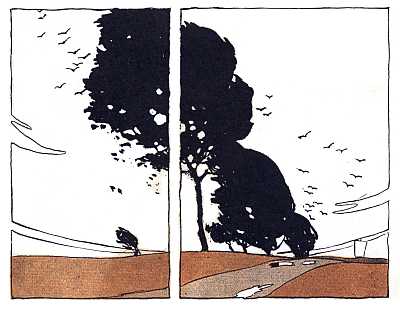
[41]
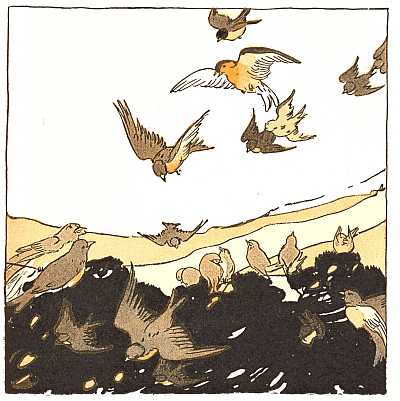
[42]
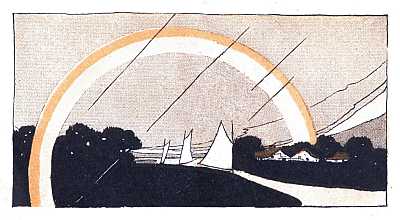
[43]
A lion was asleep in the woods.
A little mouse ran over his paw.
The lion woke up and caught him.
"You are a very little mouse, but I think I will eat you," he said.
"Do not eat me," said the mouse, "I am so little! Let me go. Some time I may be of help to you."
The lion laughed.
"What can you do?" he said.
But he let the mouse go.
Not very long after this the lion was caught by some men and made fast with a rope.
The men left him and went to get more rope, to bind him.
[44]
"Now is my time!" said the mouse.
He ran to the lion and began to gnaw the rope.
He gnawed and he gnawed.
At last he gnawed through the rope and set the lion free.
"You laughed at me," said the mouse, "but have I not helped you?"
"You have saved my life," said the lion.
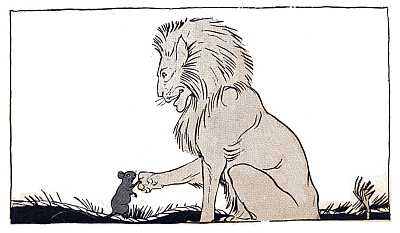
[45]
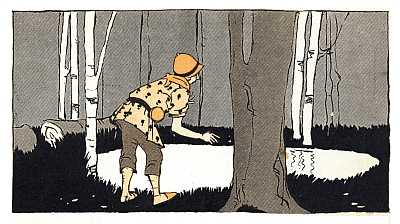
One day a woodcutter lost his ax in a pond.
He sat down by the water and said to himself, "What shall I do? I have lost my ax."
All at once a man stood beside him.
"What have you lost?" asked the man.
"I have lost my ax," said the woodcutter.
[46]
The man said nothing, but jumped into the pond and soon came out with a golden ax.
"Is this your ax?" he asked.
"No," said the honest woodcutter, "my ax was not a golden ax."
The man jumped in again, and soon came out with a silver ax.
"Is this your ax?" asked the man.
"No," said the woodcutter, "my ax was not a silver ax."
Again the man jumped in.
This time he came out with the ax that the woodcutter had lost.
"Is this your ax?" he asked.
"Yes," said the woodcutter, "thank you! How glad I am! But who are you, kind sir? You must be more than a man."
[47]
"I am Mercury," said the other, "and you are an honest woodcutter. I will give you the golden ax and the silver ax."
The woodcutter thanked him and went home.
Soon he met another woodcutter and told what Mercury had done.
This other woodcutter thought he should like a golden ax, too.
So he went to the pond and threw his ax into the water.
Then he sat down and began to cry,
"O, I have lost my ax! What shall I do? What shall I do?"
Mercury came again and jumped into the water.
Soon he came out with a golden ax.
[48]
"Is this your ax?" he asked.
"O, yes, yes! that is my ax," said the man.
"No, it is not," said Mercury. "You are not an honest woodcutter, and you shall have no golden ax."
"Then get my own ax for me," said the woodcutter.
"Get it yourself," said Mercury.
With that he went away and was seen no more.
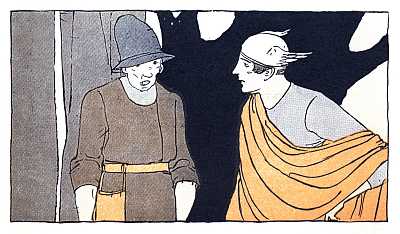
[49]
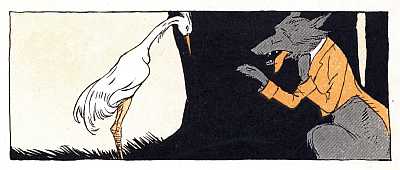
(Once a wolf was eating his supper.
He was hungry and he ate very fast.
He ate so fast that he swallowed a bone.
A crane was going by.
The wolf called to the crane.)
Wolf. My dear crane, come, help me. I have a bone in my throat.
Crane. What do you want me to do?
Wolf. Put your bill down my throat and pull out the bone.
Crane. You will bite off my head.
[50]
Wolf. O, no, I will not. I will pay you well.
(The crane came and put his head into the wolf's mouth.
Then he ran his long bill down the wolf's throat and so pulled out the bone.)
Crane. There, Brother Wolf, there is the bone. Now give me my pay.
Wolf. You have had your pay.
Crane. No, I have not.
Wolf. You have had your head in the mouth of a wolf, you have pulled it out, and your life is saved. What more can you ask?
Crane. After this, I will keep away from a wolf.
[51]
Once a country mouse asked her cousin, the town mouse, to come and visit her.
The town mouse came, and the country mouse gave her the best she had to eat.
It was only a little wheat and corn.
The town mouse ate some of it.
Then she said:
"Cousin, how can you live on this poor corn and wheat? Come to town with me, and I will give you something good."
So the two mice set off and soon came to town.
The town mouse lived well and had everything she wished for.
[52]
She had cake and pie and cheese and everything good to eat.
O, it was so good!
The country mouse was hungry, and she ate and ate and ate.
"How rich my cousin is," she said, "and how poor I am!"
As she said this, there was a great barking at the door.
Then two dogs ran into the room.
They chased the mice about, barking all the time.
At last the mice ran into a hole.
"Good-by, cousin, I am going home," said the country mouse.
"What! Are you going so soon?" asked the other.
"Yes, I do not like that kind of music with my supper.[53] It is better to have corn and wheat and be safe than to have cake and cheese and be always in fear," said the country mouse.
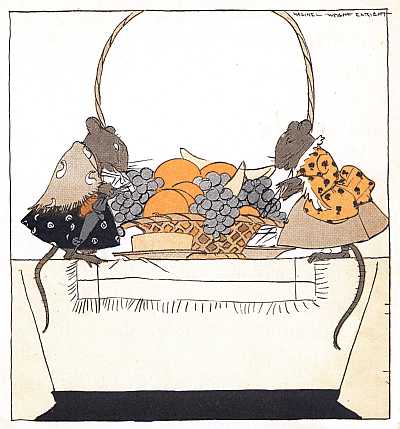
[54]
Once the wind and the sun had a quarrel.
The sun said,
"I am stronger than you."
The wind said,
"No, I am stronger than you."
"Let us see," said the sun. "Here comes a man with a big cloak. Can you make him take it off?"
"Surely I can," said the wind.
"Try," said the sun.
The sun went behind the clouds.
The wind began to blow.
How he did blow!
But the man pulled his cloak close about him.
He did not care for the wind.
[55]
At last the wind gave it up.
"Now you try," he said to the sun.
The sun came out from the clouds.
He shone down upon the man.
"How warm it is!" said the man. "I must take off my cloak."
So he took off his cloak.
"You have beaten," said the wind. "You are stronger than I."
[56]
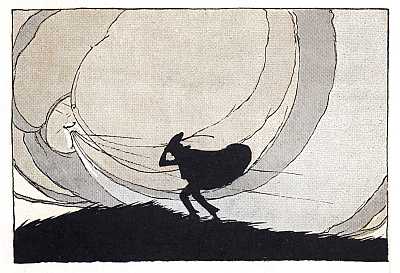
A little ant once fell into a pond.
A dove was perching in a tree over the water.
The dove saw the ant fall.
She pulled off a leaf with her bill and let it drop into the water.
"There, little ant! get on that leaf, and you will be safe," she said.
The ant jumped upon the leaf, and the wind blew it to the shore of the pond.
Not long after this, a man laid a net to catch the dove.
He pulled it in and found the dove caught fast in it.
The ant saw the man with the net, and ran up his leg and bit him.
[57]
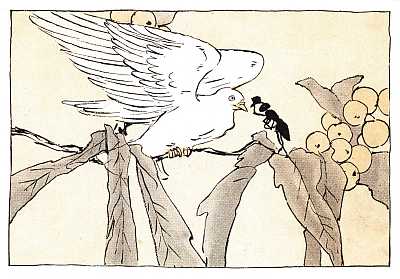
"O!" said the man, "what is that?"
He let the net drop to the ground, and the dove flew away.
Next time the dove saw the ant, she said:
"Good ant, you saved my life."
"You saved my life once, and I only tried to pay you back," said the ant.
[58]
A lark had made her nest in a field of wheat.
The wheat was almost ripe.
One day the old lark said to her young ones:
"The men will soon come to cut this wheat. You must watch for them and tell me all you see or hear while I am away."
Then she left them and went to get something for them to eat.
When she came home, she asked,
"Did you see or hear anything?"
"Yes, mother," said the young ones.
"The owner of the field came and looked at the wheat.[59] He said, 'This wheat is ripe. It must be cut at once. I will ask my neighbors to come and help me cut it.'"
"That is good," said the old lark.
"Must we not leave the nest?" asked the young ones.
"No," said the mother. "If the man waits for his neighbors to come and help him, he will wait a long time."
Next day the owner came again.
"This wheat must be cut," said he. "I cannot wait for my neighbors. I must ask my uncles and cousins."
When the old lark came home, the young ones said:
"O, mother! we must leave the nest now.
[60]
"The man said that he should ask his uncles and cousins to help him cut the wheat."
"We will not go yet," said the mother. "If he waits for his uncles and cousins, he will wait a long time."
The next day the man came again. His boy was with him.
"We can't wait any longer," he said. "We must cut the wheat ourselves."
Soon the mother lark came home.
The young ones told her what the man had said.
"Now we must be off," she cried. "When a man sets out to do his work himself, it will be done."
So the lark and her young ones left the nest and found another home.
[61]
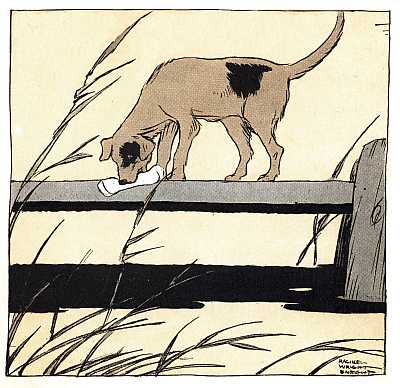
A dog once had a piece of meat.
He was going home with it.
On the way he had to go across a bridge over some water.
[62]
He looked into the water, and there he thought he saw another dog.
The dog looked like himself and had a piece of meat in his mouth, too.
It was his shadow in the water.
"That meat looks good. I want it," said the dog.
"My piece is not big enough. I will take the meat away from that other dog."
So he barked at the other dog.
As he opened his mouth to bark, his piece of meat fell into the water.
"Splash!" it went, and that was the last he ever saw of it.
"If I had let that dog keep his piece of meat, I should not have lost my own," he said.
[63]
A hungry fox once saw some sweet grapes hanging over a wall.
"I want those grapes," he said to himself.
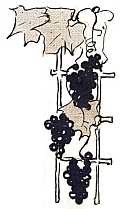
So he jumped for them.
He did not get them.
He jumped again.
Still he did not get them.
He jumped again and again.
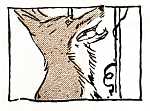
They were too high.
At last he gave it up and went away.
"I don't want those grapes," he said.
"They are sour grapes. I know they are sour. They are not fit to eat."
[64]
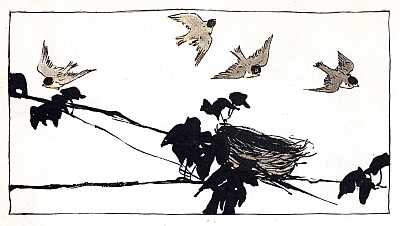
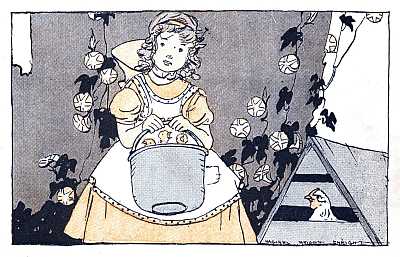
[66]
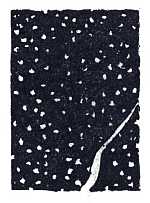
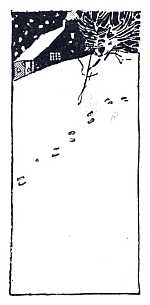
[68]
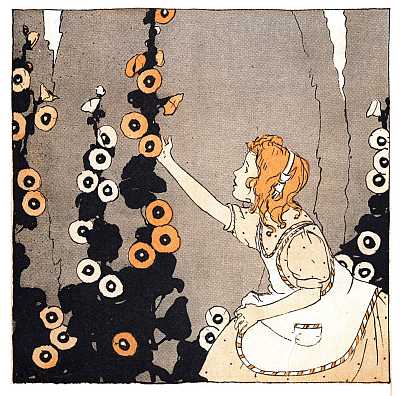
[69]
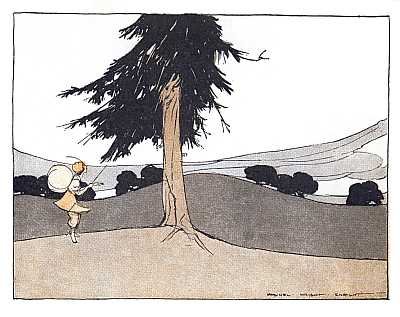
Once a little pine tree grew in a valley.
It was covered with needles that were always beautiful and green.
But it did not like the needles.
[70]
The little tree said:
"All the other trees in the woods have beautiful leaves, but I have only needles. I do not like needles. I wish I could have leaves. But I should like to be more beautiful than the other trees. I should not like green leaves. I should like gold leaves."
The little tree went to sleep.
A fairy happened to be passing and said to herself:
"This little pine tree would like gold leaves. It shall have them."
Next morning the tree woke up and found that it was covered with leaves of shining gold.
"How beautiful!" said the tree.[71] "No other tree has gold leaves!"
Soon a man came by with a bag.
He saw the gold leaves.
He ran to the little pine tree and began to pull them off and to put them into his bag.
He pulled them all off and carried them away.
The little pine tree was bare.
"O," cried the little tree, "I don't want gold leaves any more, for men will take them away. I want something beautiful that they will not take away. I think I should like glass leaves."
The little tree went to sleep.
The fairy came by again and said:
"This little tree wants glass leaves. It shall have them."
[72]
Next morning the tree woke up and found that it was covered with leaves of shining glass.
How they shone in the sun!
"These leaves are much better than gold leaves," said the little tree. "They are very beautiful."
But a wind came down the valley.
It blew and it blew.
It blew the glass leaves together and broke them all to pieces.
The little pine tree was bare again.
"I don't want glass leaves," said the little tree. "I want leaves that will not break. Perhaps green leaves are best, after all, but I want leaves. I don't want needles."
The little tree went to sleep.
[73]
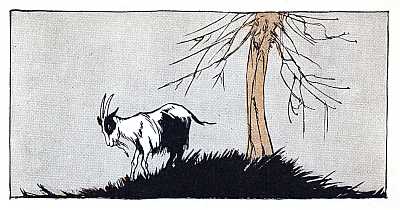
The fairy came by again and said:
"This little tree wants green leaves. It shall have them."
Next morning when the tree woke up it was covered with green leaves.
"This is fine!" said the tree. "Now I am like the other trees, but more beautiful."
Soon a goat came down the valley.
"These leaves look good," said the goat.
So he ate them all up.
[74]
The little pine tree was bare again.
"I think I don't want leaves after all," said the little pine tree. "Gold leaves are beautiful, but men carry them away. Glass leaves are beautiful, but the wind breaks them. Green leaves are beautiful, but goats eat them. My old green needles were best. I wish I could have them back."
The little pine tree went to sleep.
The fairy came by again, and said:
"This little tree has found out that needles were best for it after all. It shall have them back."
Next morning the tree woke up and had the old green needles again.
Then it was happy.
[75]
Once upon a time a man went out to seek his fortune.
As he walked along, he came to a town and saw some boys teasing a mouse.
"Let the poor mouse go. I will pay you if you will let it go," said the man.
He gave the boys a penny.
They let the mouse go, and it ran away.
After this the man went on till he came to another town.
There he saw some boys playing with a monkey.
They had hurt the poor beast so that he cried out with pain.
[76]
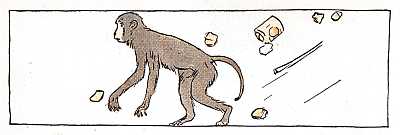
"Let the monkey go," said the man. "I will pay you to let him go."
So he gave the boys some money.
They let the monkey go, and the monkey ran away.
The man went on, and by and by he came to another town.
There he saw some boys trying to make a bear dance.
They had tied the bear with a rope and were beating him.
"Let the poor bear go," said the man. "I will pay you to let him go."
[77]
He gave the boys some money, and they let the poor beast go.
The bear, was glad to be free and walked off as fast as he could.
The man had spent all his money.
He had not a penny left.
He was hungry too, and could get nothing to eat.
Then the king's men took him and put him into a great box.
They shut and fastened the lid, and threw the box into the water.
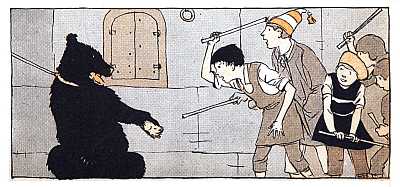
[78]
The man floated about in the water many days and thought he should never see the light again.
At last he heard something gnaw and scratch at the lid.
Then the lid flew open.
The box was on the shore, and there stood the bear, the monkey, and the mouse beside it.
They had helped him because he had helped them.
As they stood there, a round white stone rolled down to the water.
"This has come just in time," said the bear. "It is a magic stone and will take its owner wherever he wishes to go."
[79]
The man picked up the stone and wished he were in a castle with gardens around it.
All at once the castle and the gardens were there, and he was in the castle.
It was very beautiful.
Soon some merchants came by.
"See this fine castle," said one to another. "There was never a castle here till now."
The merchants went in and asked the man how he had built the castle so quickly.
"I did not do it," said the man. "My magic stone built it."
"Let us see the stone," said the merchants.
[80]
The man showed them the stone.
Then the merchants showed him gold and silver and diamonds and other beautiful things, and said:
"We will give you all these if you will give us the stone."
The things looked very beautiful to the man, so he took them and gave the stone to the merchants.
All at once he found himself again in the dark box on the water.
As soon as the bear, the monkey, and the mouse saw what had happened, they tried to help him.
But the lid was fastened more strongly than before.
They could not open it.
"We must have that stone again," said the bear.
[81]
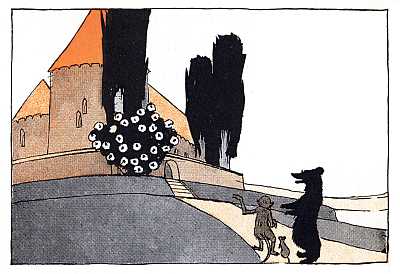
So the three faithful beasts went back to the castle and found the merchants there.
The mouse looked under the door and said:
"The stone is fastened with a red ribbon under the looking-glass, and beside it are two great cats with eyes of fire."
[82]
The bear and the monkey said:
"Wait till the men go to sleep. Then run quickly under the door, jump quickly up on the bed, scratch the nose of one of the men, and bite off one of his whiskers."
The mouse did as he was told.
The merchant woke up and rubbed his nose. Then he said:
"Those cats are good for nothing. They let the mice in, and the mice eat up my very whiskers."
So he drove the cats away.
The next night the mouse went in again. The merchants were asleep.
The mouse gnawed at the ribbon till it gave way, and the stone fell.
Then he rolled the stone out under the door.
[83]
The monkey took it and carried it down to the water.
"How shall we get out to the box?" asked the monkey.
"I will tell you," said the bear. "Sit on my back and hold fast. Carry the stone in your mouth. The mouse will sit in my right ear, and I will swim out to the box."
They did as the bear said, and were soon out in the water. No one said anything, and it was very still. The bear wanted to talk.
"How are you, Monkey?" he asked.
The monkey said nothing.
"Why don't you talk to me?" asked the bear.
"Silly!" said the monkey. "How do you think I can talk[84] when I have a stone in my mouth?"
As he said this, the stone rolled out into the water.
"Never mind," said the bear. "The frogs will get it for us."
So he asked the frogs to get it, and one of them brought it to him.
"Thank you," said the bear. "That is what we need."
Then the three faithful beasts broke open the great box.
They gave the stone to the man.
He took it and wished himself in the castle again, and wished the three faithful beasts with him.
At once they were in the castle.
The merchants were gone.
So the man and his three faithful beasts lived there ever after.
[85]
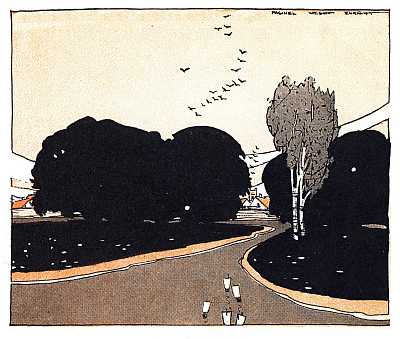
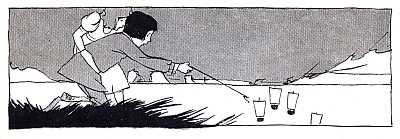


[88]








[89]
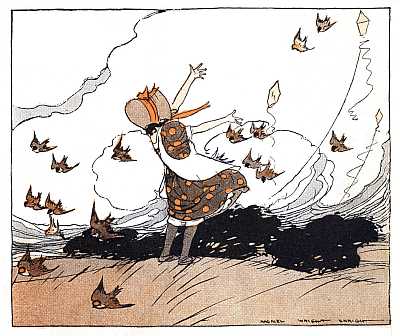
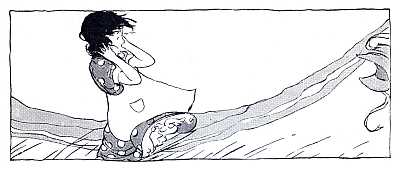
[91]
Once there was a timid little hare who was always afraid something dreadful was going to happen.
She was always saying, "What if the earth should fall in? What would happen to me then?"
One day, after she had been saying this to herself many times, a great coconut fell from a tree.
"What was that!" said the hare.
She jumped as if she had been shot.
"The earth must be falling in!" she cried.
So she ran and she ran as fast as she could run.
Soon she met another hare.
[92]
"O Brother Hare," she said, "run for your life! The earth is falling in!"
"What is that you say!" cried the other hare. "Then I will run, too."
This hare told another hare, and the other hare told other hares, and soon all the hares were running as fast as they could run, and crying:
"The earth is falling in! O, the earth is falling in!"
The big beasts heard them, and they too began to run and to cry:
"O, the earth is falling in! Run for your life!"
A wise old lion saw them running and heard them crying.
[93]
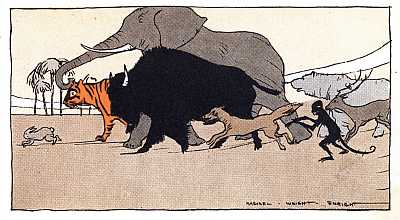
"I cannot see that the earth is falling in," he said.
Then he cried out to the poor frightened beasts to stop.
"What are you saying?" he asked.
"We said the earth is falling in," answered the elephants.
"What makes you think so?" asked the lion.
"The tigers told us," said the elephants.
[94]
"What makes the tigers think so?"
"The bears told us," said the tigers.
"What makes the bears think so?"
"The buffaloes told us," said the bears.
"Why do the buffaloes think so?"
"The deer told us," said the buffaloes.
"Why do the deer think so?"
"The monkeys told us so," said the deer.
"And how did the monkeys know?"
"The jackals said so," said the monkeys.
"And how did the jackals know?"
"The hares said it was so," said the jackals.
"And how did the hares know?"
[95]
One of the hares then said that another hare told him, and the other hare said that another told him, and so it went on until at last they came to the first little hare.
"Little hare," said the lion, "why did you say that the earth was falling in?"
"I saw it," said the little hare.
"Where?" asked the lion.
"I saw it there, under that big coconut tree," said the little hare.
"Come and show me," said the lion.
"O, no, no!" said the little hare. "I am so frightened. I couldn't go."
"Jump on my back," said the lion.
The little hare at last jumped up on the lion's back, and the lion took her back to the big tree.
[96]
Just then another coconut fell with a great noise among the leaves.
"O, run, run!" cried the timid hare. "There is that dreadful thing again!"
"Stop and look," said the lion.
As the hare could not get down from the lion's back, she had to stop and look.
"Now what do you think it is?" asked the lion.
"I think it must be a coconut," said the little hare.
"Then I think you had better go and tell the other beasts," said the lion.
So the little hare told the other beasts that the earth was not falling in, after all. It was a coconut that was falling.
[97]
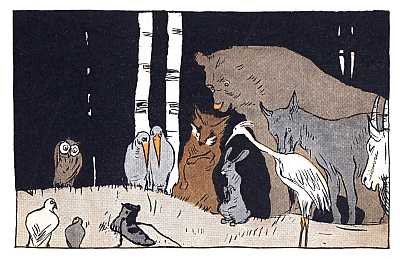
(A man once left his shoe in the woods. The beasts found it.
They had never seen anything like it before, so they came together and began to talk about it.)
Bear. It must be the husk or the outside of some fruit.
All the Birds. O, just hear him!
All the Beasts. O, just hear him!
[98]
Wolf. No, that is not it. It is some kind of nest. See! Here is the hole at the top, for the bird to go into, and here is the place for the eggs and the young birds.
Birds. O, just hear him!
Bear. Just hear him talk!
Goat. No, you are both wrong. It is the root of some plant.
(He showed them the shoe string hanging at the side.)
See this long, fine root. Surely it is a root!
Birds. O, just hear him talk!
Beasts. Just hear him!
Bear. I tell you it is the husk of a fruit.
Wolf. And I tell you it is a nest.
[99]
Goat. And I tell you it is a root. Surely it is a root!
Owl. Let me speak. I have lived among men, and I have seen many such things as this. It is a man's shoe.
Bear. What is a man?
Goat. What is a shoe?
Owl. A man is a thing with two legs. He can stand up like a monkey, he can walk like a bird, but he cannot fly. He can eat and talk, and he can do many things that we cannot do.
Beasts. O, no!
Birds. No, no!
Bear. How can that be? How can anything with two legs do more than we, who have four?
[100]
Birds. And this thing you call a man cannot be good for much if he cannot fly.
Goat. But what does the man do with this root?
Owl. It is not a root. I tell you it is a shoe.
Wolf. And what is a shoe?
Owl. It is what the man puts on his feet. He puts one of these shoes on each of his feet.
Birds. Hear the owl talk!
Beasts. Who ever heard of such a thing as a shoe?
Goat. Hear that! The man puts them on his feet!
Wolf. It is not true!
Bear. No, it is not true! The owl doesn't know.
[101]
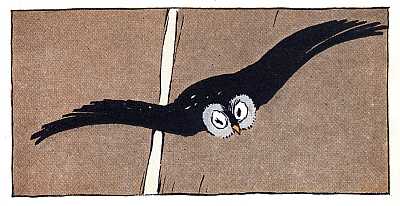
Wolf. You know nothing, Owl. Get out of our woods. You are not fit to live with us.
Bear. Yes, Owl, go away!
Beasts. Leave us! Go away!
Birds. Leave us! Leave us, Owl! You surely don't know what you are talking about!
(The beasts chase the owl out of the woods.)
Owl. (Going off) But it is a shoe, anyway.
[102]
Once upon a time a camel and a jackal lived together by the side of a river.
One fine morning the jackal said:
"There is a big field of sugar cane over on the other side of the river. Take me on your back, Brother Camel, and I will show you where it is. You may eat all the sugar cane, and I will find some crabs or fish on the shore."
This pleased the camel very much. So he waded through the river and carried the jackal on his back.
The jackal could not swim.
The camel found the sugar cane, and the jackal found some crabs.
[103]
The jackal ate much faster than the camel and soon had enough.
"Now, Brother Camel," he said, "take me back. I have had enough."
"But I haven't," said the camel.
So the camel went on eating.
The jackal tried to think how he could make the camel go home.
At last he thought of a way.
He began to bark and to cry and to make such a noise that all the men from the village ran out to see what was going on.
There they found the camel eating the sugar cane, and at once they beat the poor beast with sticks and so drove him out of the field.
"Brother Camel, hadn't you better go home now?" asked the jackal.
[104]
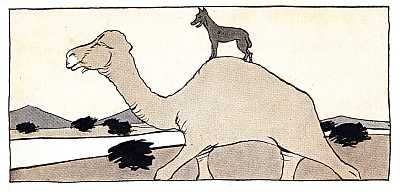
"Yes, jackal, jump on my back," said the camel.
The jackal jumped on his back, and the camel waded through the river with him.
As he went, he said to the jackal:
"Brother Jackal, I think you have not been very good to me to-day. Why did you make such a noise?"
"O, I don't know," said the jackal. "It's a way I sometimes have. I like to sing a little, after dinner."
[105]
The camel waded on.
When they got out where the water was deep, the camel stopped and said, "Jackal, I feel as if I must roll a little in the water.
"O, no, no!" said the jackal. "Why do you want to do that?"
"O, I don't know," said the camel. "It's a way I sometimes have. I like to roll a little, after dinner."
With that, he rolled over, and the jackal fell into the water.
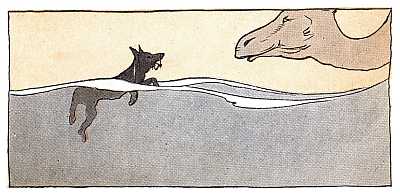
[106]

1 Copyright, 1890, by Little, Brown, and Company.
[107]
[108]



[111]
Once on a time there was a woman who had two daughters. The older was very much like her mother, and was very ugly.
The younger was not like her, but was very good and beautiful.
The woman liked the older girl because she was like herself.
She did not like the younger; so she made her do all the hard work.
One day the younger daughter had gone to the spring to get water. It was a long way from home.
As she was standing by the spring, a poor old woman came by and asked her for a drink.
[112]
"Indeed, you shall have a drink," said the girl.
She filled her pitcher and gave the old woman some water.
The woman drank, and then said, "You are so kind and good, my dear, that I will give you a gift."
Now this old woman was a fairy, but the girl did not know it.
"I will give you a gift," she said, "and this shall be the gift: With every word that you speak, either a flower or a jewel shall fall from your mouth."
When the younger girl came home, her mother scolded her because she had been so long at the spring.
"I am very sorry indeed, mother," said the girl.
[113]
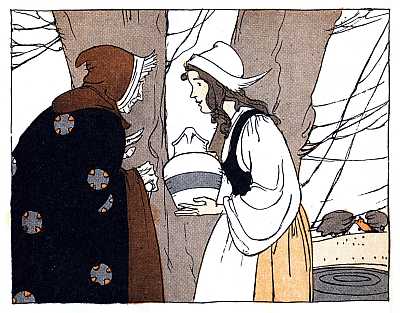
At once two roses, two pearls, and two diamonds fell from her mouth.
"What is this!" cried the mother. "I think I see pearls and diamonds falling out of your mouth! How does this happen, my child?"
This was the first time the woman had ever called her "my child."
[114]
The girl told her all that had happened, and while she spoke, many more diamonds fell from her mouth.
"Well, well, well!" said the woman, "I must surely send my dear Fanny to the spring, so that she too may have this gift."
Then she called her older daughter. "Fanny, my dear, come here! See what has happened to your sister. Should you not like to have such diamonds whenever you wish them?
"All you need to do is to go out to the spring to get some water. An old woman will ask for a drink and you will give it to her."
"I think I see myself going out there to the spring to get water!" said the older daughter.
[115]
"Go at once!" said the mother.
So the older daughter went.
She took with her the best silver pitcher in the house, and grumbled all the way.
When she had come to the spring, she saw a lady in beautiful clothes standing under a tree.
The lady came to her and asked for a drink.
It was really the fairy, but now she looked like a princess.
The older daughter did not know that it was the fairy, so she said:
"Do you think that I came to the spring to get water just for you, or that I brought this fine silver pitcher so that you could drink from it? Drink from the spring if you wish."
[116]
"You are not very polite, I think," said the fairy, "but I will give you a gift, and this shall be the gift: With every word that you speak, either a snake or a toad shall fall from your mouth."
When the older daughter went back to the house, her mother called out, "Well, daughter?"
"Well, mother," said the girl, and as she spoke, a snake and a toad fell out of her mouth.
"What!" cried the mother. "Your sister has done all this, but she shall pay for it!"
With that, the mother took a stick and ran after the younger daughter.
The poor child ran away from her and hid in the woods.
[117]
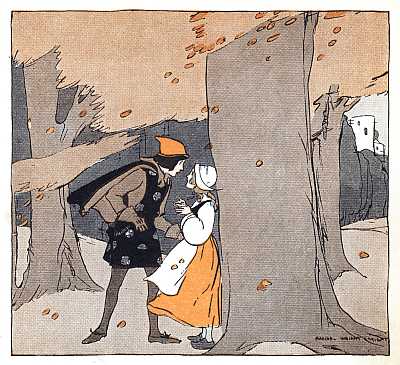
The prince of that country had been hunting and happened to pass through those woods on his way home.
He saw the young girl and asked her why she was standing there and crying, all alone in the woods.
[118]
"O sir, my mother has turned me out of the house," she said.
The prince was greatly surprised to see five or six pearls and as many diamonds fall from her mouth as she spoke.
"Tell me how all this happened," said the prince.
So she told him all about it.
The prince took her with him, and they went to the king's house, and there they were married, and were very happy.
But the older sister grew more and more ugly in her heart, until even her mother could not live with her.
So her mother turned her out, and no one ever heard of her again.
[119]
Once there was a poor woodcutter who had so many children that it was hard to get enough for them to eat.
They were all pretty children, but the youngest daughter was the prettiest of them all.
One cold, dark night in the fall they were sitting around the fire, when all at once something went rap! rap! rap! on the window.
The father went out to see what it was, and there stood a big white bear.
"Good evening," said the bear.
"The same to you," said the man.
[120]
"Give me your youngest daughter, and you shall be rich," said the bear.
"You can't have her," said the man.
"Think it over," said the bear, "I will come again next week."
Then the bear went away.
They talked it over and at last the youngest daughter said that she would go away with the bear when he came back.
Next Thursday night they heard the rap! rap! rap! on the window, and there was the white bear again.
The girl went out and climbed up on his back and off they went.
When they had gone a little way, the bear turned around and asked, "Are you afraid?"
No, she was not afraid.
[121]
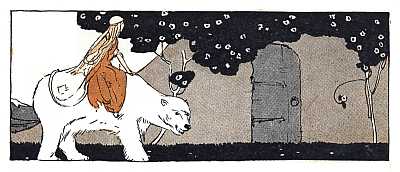
"Well, hold fast to me, and there will be nothing to be afraid of," said the bear.
They went a long, long way, until they came to a great hill.
The bear knocked on the ground, and a door opened. They went in.
It was a castle, with many lights, and it shone with silver and gold.
The white bear gave to the girl a silver bell, and said to her, "Ring this bell when you want anything."
Then he went away.
[122]
Every night, when all the lights had been put out, the bear came and talked with her. He slept in a bed in the great hall.
But it was so dark that she could never see him, or know how he looked, and when she took his paw, it was not like a paw. It was like a hand.
She wanted so much to see him! but he told her she must not.
At last she felt that she could not wait any longer.
So one night, when he was asleep, she lighted a candle and bent over and looked at him.
What do you think she saw?
It was not a bear, but a prince, and the most beautiful prince that was ever seen!
[123]
She was so surprised that her hand began to shake, and three drops from the candle fell upon the coat of the prince.
This woke him up.
"What have you done?" he cried. "You have brought trouble upon us. An ugly witch turned me into a bear, but every night I am myself again, and if you had waited only a year, and had not tried to find me out, I should have been free.
"Now I must go back to my other castle and marry an ugly princess with a nose three yards long."
The girl cried and cried and cried, but it did no good.
She asked if she could go with him, but he said that she could not.
[124]
"Tell me the way there," she said, "and I will find you."
"It is East of the Sun and West of the Moon, but there is no way to it," he said.
Next morning when the girl awoke, she found herself all alone in the deep woods.
She set out and walked and walked till she came to a very old woman sitting under a hill. The old woman had a golden apple in her hand.
The girl asked the woman to tell her the way to the castle of the prince who lived East of the Sun and West of the Moon.
The old woman didn't know, but she gave the girl the golden apple, and lent her a horse, and said to her:
[125]
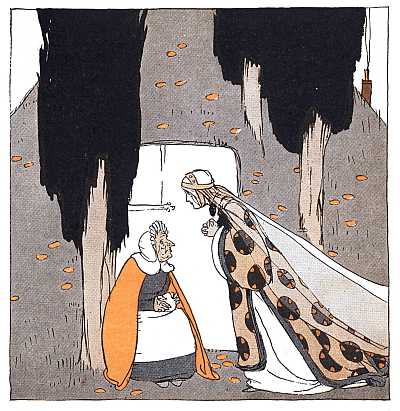
"Ask my next neighbor. Maybe she will know. And when you find her, switch my horse under the left ear and tell him to be off home."
[126]
So the girl got on the horse and rode until she came to an old woman with a golden comb. This old woman answered her as the first had done, and lent her another horse and gave her the golden comb.
The girl got on the horse and rode till she came to another old woman spinning on a golden spinning wheel. This old woman did as the others had done, and lent her another horse and gave her the golden spinning wheel.
"You might ask the East Wind. Maybe he will know," she said.
So the girl rode on until she came to the house of the East Wind.
"I have heard of the prince and his castle, but I never went so far as that," said the East Wind.
[127]
"Get on my back, and I will carry you to my brother, the West Wind. Maybe he will know."
She got on his back, and away they went. O how fast they went!
At last they found the West Wind, but he had never been so far as the castle of the prince.
"Get on my back," said West Wind, "and I will take you to our brother, the South Wind. He will know, for he has been everywhere."
So she got on the West Wind, and away they went to the South Wind.
"It is a long way to that castle," said the South Wind, with a sigh. "I have never been so far as that, but our brother, the North Wind, is stronger than any of us. If he has[128] not been there, you will never find the way, and you might as well give it up. So get on my back, and I will take you to him."
The girl got on the back of the South Wind, and soon they came to where the North Wind lived.
"Boo-oo-oo! What do you want?" roared the North Wind.
"Here is a girl who is looking for the prince that lives East of the Sun and West of the Moon. Do you know where that is?" asked the South Wind.
"Yes, once I blew a leaf as far as that, and I was so tired after it that I couldn't blow for a long time. But if you are sure you want to go and are not afraid, I'll take you."
Yes, she was sure she wanted to go.
[129]
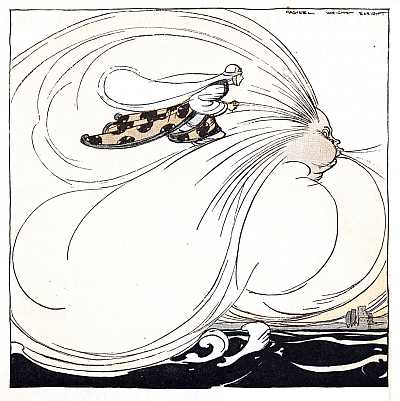
North Wind blew himself out so big that he was dreadful to look at.
But she jumped on his back, and away they went.
How they did go!
[130]
The North Wind grew so tired that he almost had to stop.
His feet began to trail in the sea.
"Are you afraid?" he asked.
No, she was not afraid.
So they kept going on and on, till at last they came to the castle, and the North Wind put her down and went away and left her.
The next morning, as she sat there, Princess Long-Nose looked out of the window.
"What will you take for your big golden apple?" asked Long-Nose.
"It is not for sale," said the girl.
"I will give you anything you ask," said Long-Nose.
"Let me speak to the prince, and you may have it," said the girl.
[131]
"Very well," said Long-Nose.
She made the girl wait till night, and then let her in, but the prince was fast asleep.
He would not wake up.
Long-Nose had given him a kind of drink to make him sleep soundly.
So the girl went sadly out.
Next morning Long-Nose looked out of the window and said to her, "What will you take for the comb?"
"It is not for sale," said the girl.
Long-Nose said that the girl might see the prince again if she would give her the comb.
So she saw the prince again, but he was asleep as before.
Next morning Long-Nose looked out and saw the spinning wheel.
[132]
She wanted that too. So she said she would let the girl come in and see the prince once more if she would give her the spinning wheel.
Some one told the prince about it, and that night he did not take the drink which Long-Nose gave to him. He threw it out of the window.
When the girl came, he was awake, and she told him her story.
"You are just in time," said the prince, "for to-morrow I was to be married to Long-Nose.
"Now I will have no one but you. I will tell Long-Nose that I will marry no one who cannot wash three drops of candle grease out of my coat. She cannot do it, but I know that you can."
[133]
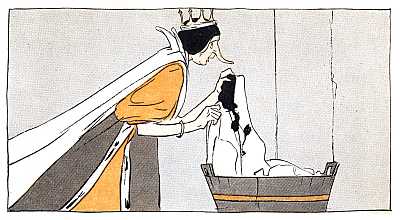
So the next morning the prince said that he must have three drops of grease washed out of his coat, and that he would marry no one who couldn't wash them out.
Long-Nose began to wash the coat, but she couldn't get the grease out. It turned black.
Then the old witch tried, but she had no better luck.
Then the younger witches tried.
[134]
"You cannot wash," said the prince. "I believe the poor girl out under the window can wash better than you. Let her try."
So the girl came in and tried, and as soon as she put the coat into the water it was white as snow.
"You are the girl for me!" said the prince.
At this the old witch flew into such a rage that she fell to pieces, and Princess Long-Nose fell to pieces, and the younger witches all fell to pieces. And no one could ever put them together again.
The prince married the poor girl, and they flew away as far as they could from the castle that lay East of the Sun and West of the Moon.
[135]
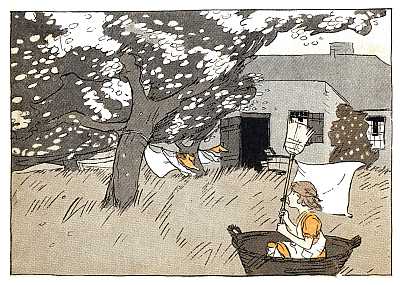
[137]

[138]
Among the pine trees, by a quiet lake, stood the wigwam of a great Indian whose name was Big Moose. His sister kept the wigwam for him, and took care of all that was his. Her name was White Maiden.
No one but White Maiden had ever seen Big Moose. The Indians could see the marks of his feet in the snow, and they could hear his sled as it ran over the ice, but they could not see him.
It was said that this was because they were not kind and good.
White Maiden was kind and good, and she could always see him.
[139]
One day White Maiden called all the Indian maidens and said:
"My brother, Big Moose, wishes to marry, but he will not marry any one who cannot see him, and only those who are good can see him."
All the Indian maidens were glad when they heard that Big Moose wished to marry. They had all heard how brave and strong he was, and what a great hunter he was, and how kind and good and wonderful he was, in every way.
Each wished that he would choose her for his wife, and each was very sure that she could see him.
For a long time after that the Indian maidens would go down to the wigwam of Big Moose, by the lake,[140] and try to see him. Every evening some of them would go at sunset and sit and watch for him.
When he came they would hear him, and the door of the wigwam would be opened, and he would go in, but they could not see him.
At the other end of the village lived an old Indian with his three daughters. The two older daughters were not kind to the youngest one. They made her do all the work and gave her little to eat.
The oldest sister had a very hard heart. Once, when she was angry, she threw a pail of hot ashes at the youngest sister.
The child's face was burned, and she was called Little Scar-Face.
[141]
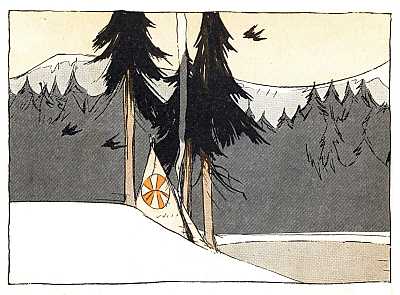
One day in early winter, when the first white snow lay on the ground, the oldest sister said:
"Come, Scar-Face, bring me my shell beads and help me to dress. I am going to marry Big Moose."
Little Scar-Face brought the beads and put them on the oldest sister and helped her to dress.
[142]
At sunset the oldest sister went down to the wigwam by the lake. White Maiden asked her to come in. By and by they heard Big Moose. They could hear his sled running through the snow.
White Maiden took the sister to the door of the wigwam and said, "Can you see my brother?"
"Yes, I can see him very well," answered the other.
"Then look and tell me what the string of his sled is made of," said White Maiden.
"It is made of moose skin," said the sister of Little Scar-Face.
"No, it is not made of moose skin. You have not seen my brother. You must go away," said White Maiden.
[143]
So she drove out the oldest sister. Next day the next to the oldest sister said to Little Scar-Face:
"Come, Scar-Face, bring me my shell beads and help me to dress. I am going to marry Big Moose."
Little Scar-Face brought the beads and helped her sister to dress.
In the evening, just at sunset, the sister went down through the pine trees to the lake.
"Come in," said White Maiden.
Soon they heard Big Moose coming.
"Can you see my brother?" asked White Maiden.
"Yes, I can see him very well," said the other.
"Then what is his sled string made of?" asked White Maiden.
[144]
"It is made of deerskin," said the other.
"No, it is not made of deerskin," said White Maiden.
"You have not seen my brother. You must go away."
And she drove her out.
The next morning Little Scar-Face worked very hard. She built the fire and carried out all the ashes and brought in the wood and did everything that she could.
Then she said to her two sisters, "Sisters, let me take your beads. I too should like to find out if I can see Big Moose."
Her sisters laughed loud and long. They would not let her take their beads. No, indeed!
[145]
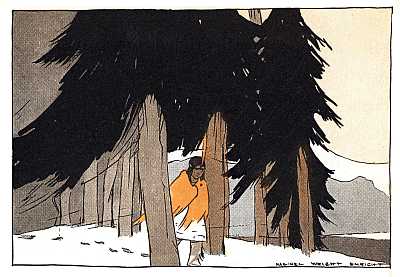
At last one of the sisters said she had an old broken string of beads that Scar-Face might take.
So Little Scar-Face took the old broken string of beads and tied it together and put it on. Then she made a queer little dress out of birch bark, and she washed herself all fresh and clean, and brushed her[146] hair, and put on the dress and the old string of beads. So she went down through the village and the dark pine woods to the wigwam of Big Moose.
She was not a pretty child, for her face and hair were burned, and her clothes were very queer.
But White Maiden asked her to come in and spoke kindly to her. So she went in and sat down.
Soon she heard Big Moose coming.
White Maiden took her to the door of the wigwam and said:
"Little Scar-Face, can you see my brother?"
"Yes, indeed, and I am afraid, for his face is very wonderful and very beautiful."
[147]
"What is his sled string made of?" asked White Maiden.
"How wonderful! how wonderful!" cried Little Scar-Face.
"His sled string is the rainbow!"
Big Moose heard her and said, "Sister, wash the eyes and hair of Little Scar-Face in the magic water."
White Maiden did so, and every scar faded away, and the hair of Little Scar-Face grew long and black, and her eyes were like two stars.
White Maiden put a wonderful dress of deerskin and a string of golden beads on Little Scar-Face, and she was more beautiful than any of the other maidens.
And Big Moose made her his wife.
[148]
Once there was a great hunter who was very rich. He had many strings of shell money around his neck. The Indians call these shells wampum.
In the woods near his home lived a big white elk that used to come and talk to him. The elk told him what was right and what was wrong. The Great Spirit sent the elk to him.
When he obeyed the elk, he was happy and everything went well, but when he did not obey, he was not happy, and everything went wrong.
One day the elk said to him:
"You are too hungry for wampum. Look! your neck and shoulders are covered with long strings of wampum.[149] Some of it belongs to your wife. You took it from her. You took some of it from other Indians and gave them deer meat that was not fit to eat. You are not honest."
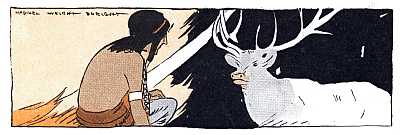
The hunter was much ashamed, but he would not give back the wampum. He thought too much of it to give it back.
"I will give you enough wampum to fill your heart," said the elk, "but you must do just as I tell you. Will you do it?"
"I will do it," said the hunter.
[150]
"Go to the top of the great white mountain. There you will find a black lake. Across the lake are three black rocks. One of them is like the head of a moose.
"Dig in the earth before this rock. There you will find a cave full of wampum. It is on strings of elk skin. Take all you want.
"While you dig, twelve otters will come out of the black lake. Put a string of wampum around the neck of each of the otters and upon each of the three black rocks."
The hunter went back to the village. There he got an elk-horn pick and set out. No one knew where he went.
He made his camp that night at the foot of the great white mountain.[151] As soon as it was light, he began to climb up the mountain side. At last he stood on the top, and there before him was a great hollow. It was so great that he could not shoot an arrow across it.
The hollow was white with snow, but in the middle was a black lake, and on the other side of the lake stood the three black rocks.
The hunter walked around the lake over the snow. Then he took the elk-horn pick and struck one blow before the black rock which looked like the head of a moose.
Four great otters came up out of the black lake and sat beside him.
He struck another blow. Four more otters came and sat behind him.
[152]
He struck again. Four more otters came and sat on the other side.
At last the pick struck a rock. The hunter dug it out, and beneath it was a cave full of wampum.
The hunter put both of his hands into the wampum and played with it. It felt good. He took out great strings of it and put them around his neck and over his shoulders.
He worked fast, for the sun was now going down, and he must go home.
He put so many strings of wampum around his neck and shoulders that he could hardly walk.
But he did not put any around the necks of the twelve otters, nor on the three black rocks. He did not give them one string—not one shell.
[153]
He forgot what the white elk had told him. He did not obey.
Soon it grew dark. He crept along by the shore of the big black lake. The otters jumped into it and swam and beat the water into white foam. A black mist came over the mountain.
Then the storm winds came, and the Great Spirit was in the storm.
It seemed as if the storm said, "You did not obey! You did not obey!"
Then the thunder roared at him, "You did not obey!"
The hunter was greatly frightened. He broke a great string of wampum and threw it to the storm winds, but the storm winds only laughed.
He broke another string and threw it to the thunder voices, but the[154] thunder roared louder than before.
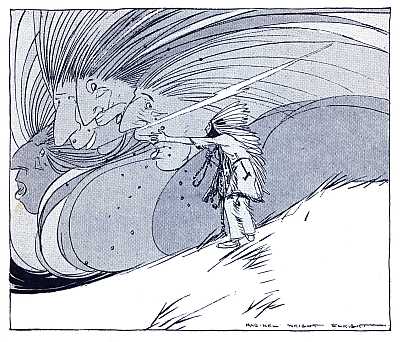
He threw away one string after another until all of them were gone. Then he fell upon the ground and went to sleep. He slept long.
When he woke up he was an old man with white hair. He did not know[155] what had happened, but he sat there and looked at the great mountain, and his heart was full of peace.
"I have no wampum. I have given it all away. I am not hungry for it any more. I will go home," he said.
He could hardly find his way, for the trees had grown across the trail.
When at last he got home, no one but his wife knew him. She was now very old and had white hair like himself. She showed him a tall man near by, and said it was their baby.
The hunter looked at them.
"I have slept many moons," he said.
He lived among the Indians long after that and taught them much. He taught them to keep their word, and to obey the Great Spirit.
[156]
One summer evening, many years ago, some Indians were sitting out under the stars, telling stories.
All at once they saw a star fall. It fell halfway down the sky.
That night one of the Indians had a dream about the star. It seemed to come and stand beside him, and it was like a young girl, dressed all in white.
She said, "I have left my home in the sky because I love the Indians and want to live among them. Call your wise men together and ask them what shape I shall take."
The Indian woke up and called all the wise men together.
[157]
Then he told them his dream.
The wise men said, "Let her choose what shape she will take. She may live in the top of a tree, or she may live in a flower, or she may live where she will."
Every night the star came down a little lower in the sky, and stood over the valley where the Indians lived, and made it very bright.
Then one night it fell down upon the side of the mountain and became a white rose.
But it was lonely on the mountain. The rose could see the Indians, but it could not hear them talk. So one day it left the mountain and came down into the plain and became a great white prairie flower.
[158]
Here it lived for a time. But the buffaloes and the other wild beasts of the prairie ran all around it and over it, and it was afraid.
One night the Indians saw a star go up from the prairie.
They knew that it was the prairie flower and they thought that it was going back into the sky.
But it floated toward them until it came over the lake that lay just beside them.
It looked down into the lake, and there it saw its shadow and the shadows of the other stars that live in the sky.
It came down lower and lower, and at last floated on the top of the water.
[159]
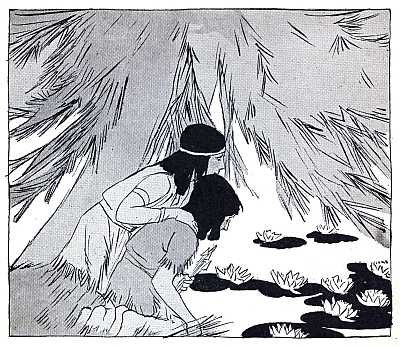
The next morning the lake was covered with water lilies.
"See! the stars have blossomed!" said all the children.
But the wise men answered:
"It is the white star and her sisters. They will stay with us."
[160]
A poor beggar, with a ragged old bag, crept along the road one day, begging his bread.
As he went he grumbled to himself because there were so many rich men in the world.
"The rich never think that they have enough," he said to himself. "They always want more than they have. Now if I had a very little money, I should be happy. I should not want too much."
A fairy named Fortune, who brought good gifts to men, heard the poor beggar grumbling to himself and came to him.
[161]
"Friend," said Fortune, "I have wanted to help you. Open your bag. I will give you all the gold that it will hold. But if any falls out upon the ground, it will turn to dust. Your bag is old. Don't try to have it too full, for if you do, it will break, and you will lose all."
The beggar was so happy that he began to dance up and down.
He opened his bag and let the gold run into it in a big, yellow stream. Soon the bag was almost full.
"Is that enough?" asked Fortune.
"No," said the beggar, "not yet."
"The bag is old. It is going to break," said Fortune.
"Never fear!" said the beggar.
"But you are now a rich man.[162] Isn't that enough?" asked Fortune.
"A little more," said the beggar.
"Now," said Fortune, "the bag is full, but take care, or you will lose it."
"Just a little more," said the beggar.
Fortune put in just a little more. The bag broke. All the gold fell through upon the ground and turned to dust.
The beggar had nothing left but his old broken bag. He was as poor as he had been before.
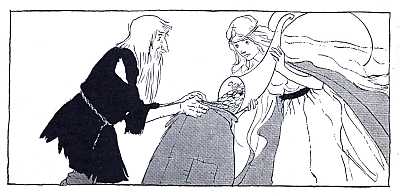
[163]
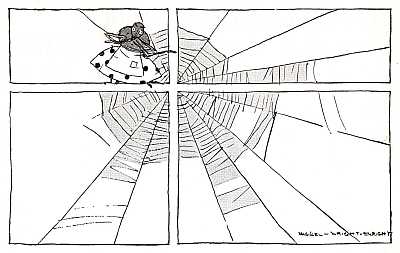
A merchant brought some linen to a fair and opened a shop. It was good linen, and many came to buy of him.
A spider saw what was going on, and said to herself:
"I can spin. Why shouldn't I open a shop, too?"
So the spider opened a little shop[164] in the corner of a window, and spun all night, and made a beautiful web. She hung it out where everybody could see it.
"That is fine!" said the spider. "Surely, when the morning comes, all will want to buy it."
At last the morning came.
A man saw the web in the corner and swept it away, spider and all.
"That is a pretty thing to do!" cried the spider. "I should like to ask whose work is the finer, mine or that merchant's?"
A bee happened to fly past.
"Yours is the finer," said the bee. "We all know that. But what is it good for? It will neither warm nor cover any one."
[165]
(A stone lay in a field. A farmer and his son were talking near by.)
Farmer. That was a fine rain we had this morning.
Son. Yes, indeed! A rain like that makes everybody glad.
Farmer. I have been wishing a long time for such a rain as that.
Son. It was better than gold.
(As they walked away, a worm crept out from under the stone. The stone called to the worm.)
Stone. Friend Worm, did you hear what those men were saying?
Worm. Yes, they were saying how good the rain was.
[166]
Stone. What has the rain done, I should like to know? It rained two hours and made me all wet.
Worm. That didn't hurt you.
Stone. Yes, it did. But it hurts me more to hear everybody saying how fine the rain was. Why don't they talk about me? I have been here for hundreds of years. I hurt nobody. I wet nobody. I stay quietly where I am put. Yet nobody ever has a kind word for me.
Worm. Stop your talk. This rain has helped the wheat and made it grow. And the wheat will help the farmer. It will give him bread. What have you ever given to anybody?
[167]
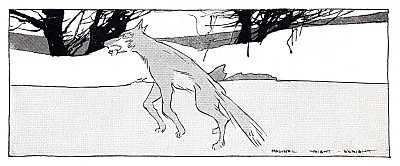
Very early one winter morning a fox was drinking at a hole in the ice.
While he was drinking, the end of his tail got into the water, and there it froze fast.
He could have pulled it out and left some of the hairs behind, but he would not do this.
"How can I spoil such a beautiful tail!" said the fox to himself.
"No, I will wait a little. The men[168] are asleep and will not catch me. Perhaps when the sun comes up the ice will melt."
So he waited, and the water froze harder and harder.
At last the sun came up.
The fox could see men coming down to the pond. He pulled and pulled, but now his tail was frozen so fast that he could not pull it out.
Just then a wolf came by.
"Help me, friend," cried the fox, "or I shall be lost."
The wolf helped him, and set him free very quickly. He bit off the tail of the fox.
So the fox lost all of his fine great tail because he would not give up a little hair from it.
[169]
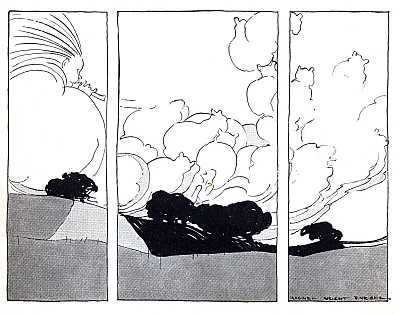
[171]
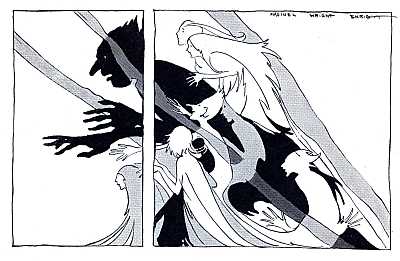
[173]

[174]
A great many years ago the Greeks told beautiful stories about what they saw in the earth and in the sky and in the sea.
They said the Sun drove each day across the sky in a car of fire, and gave light and heat to men.
He always had a bow and arrows with him, and his arrows were the sunbeams.
When he shot them very hard and struck men with them, the men were said to be sun-struck, but when he let the arrows fall gently on the earth, they did only good.
[175]
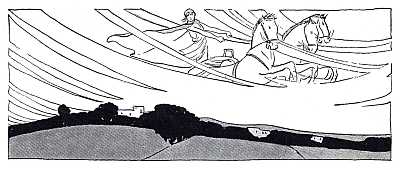
The Sun was called Apollo.
He was said to be a beautiful young man with golden hair, and he made wonderful music on a kind of harp called a lyre.
Men loved him, but they were a little afraid of him, too; he was so bright and strong.
His sister was the Moon. Her name was Artemis, or Diana. She rode through the sky at night in a silver car, and she, too, had a bow and arrows.
[176]
Her bow was a silver bow, and her arrows were the moonbeams.
She loved hunting, and often at night she would come down to earth and roam through the woods with her bow in her hand and her arrows at her side or on her back.
In pictures she is always seen with a little new moon in her hair.
Artemis was so beautiful that men were afraid to look at her. It was said that if any man should look full at her he would lose his mind.
So when she came to those whom she did not wish to hurt, she covered herself with clouds.
For a time the good giant Orion helped Artemis in her hunting, for he too was a great hunter. Artemis[177] loved him as well as she loved any one, but she was very cold and did not care much for anybody.
After a time Orion left her. He wanted to marry the daughter of a king in one of the islands of the sea. The king said that he might if he would drive all the wild beasts out of the island. Orion did this, but the king did not keep his word.
Instead of that, he put out the eyes of Orion, but Orion went to Apollo, and was made to see again.
Then Orion went back to help Artemis with her hunting, but Apollo did not like that and wished to get rid of him.
He did not wish, himself, to hurt Orion, so he made Artemis do it.
[178]
"Sister," he said to her one day, "some men say that you can shoot as well as I can, but we all know that is not so."
"I should like to know why it is not so!" said Artemis.
"Well, let us try," said Apollo. "Do you see that little black speck away out there in the sea?"
"Yes, I see it," said Artemis.
"Can you hit it?" asked Apollo.
"Indeed I can," said Artemis; and with that she let an arrow fly from her bow. It went straight through the black speck.
The black speck was the head of Orion. He was swimming back to Artemis from the country of the bad king.
[179]
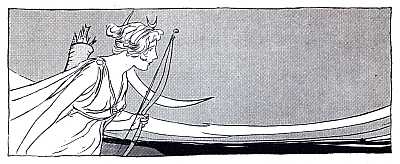
The speck at once went under the water and was seen no more.
When Artemis found what she had done, she was very sad indeed. She could not bring Orion back to earth, but she took him up into the sky and put him among the stars, and there he is standing to this day.
If you will look up into the sky on any clear winter night, you can see him. Just before him is his dog. We call it the Dog Star.
[180]
The Sun and the Moon had a brother, the Summer Wind. His name was Hermes, but sometimes he was called Mercury.
He had shoes with wings on them, which always took him very quickly wherever he wished to go, and he had a magic cap which kept him from being seen.
He ran on errands for his father and his older brothers. He went everywhere, and he often picked up things that lay in his way, and that didn't belong to him.
One day, when he was a small child, he crept down to the seaside and there found the shell of a tortoise.[181] He stretched some strings tightly across it, and blew upon the strings, and made wonderful music.
He called this thing a lyre.
On the same day, toward evening, he looked across the meadows and saw some beautiful white cows. His brother Apollo was looking after them.
"What fun it would be to drive those cows away!" he said.
So he crept up behind the cows while Apollo was not looking, and he drove them away. He drove them far, and at last shut them up in a cave, where he thought Apollo could not find them.
Apollo saw that the cows were gone, and went to look for them, but he had a hard time.
[182]
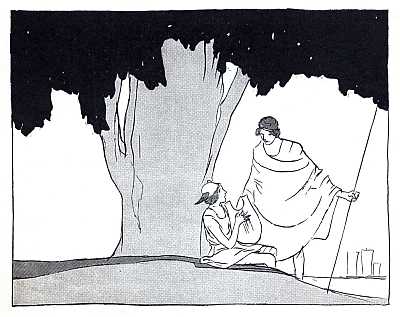
He thought that Hermes might have had something to do with them. So he went to Hermes.
Hermes was playing upon the lyre which he had made, and was singing gently to himself.
The music was so beautiful that Apollo forgot all about his cows.
[183]
"Where did you find that wonderful thing?" asked Apollo.
"O, I made it," said Hermes.
"Let me see it!" cried Apollo. "Show me how to play upon it."
Hermes showed him, and Apollo sat down and played until it grew dark.
"O, give me this thing! I must have it," said Apollo.
So Hermes gave it to him, and Apollo played upon it, gently at first, and then louder. He made such wild, sweet music as had never before been heard.
To pay for the lyre, Apollo gave Hermes a magic stick which would bring sleep to men and would stop all quarreling.
One day Hermes saw two snakes[184] fighting. He touched them with the magic stick, and they stopped at once and wound themselves around it, and stayed there ever after.
In the pictures of Hermes you will see this magic stick with the snakes around it. You will see, too, the cap and the shoes, with the wings upon them.
When Hermes and Apollo had made these gifts to each other, Apollo said:
"Hermes, my dear boy, you like my white cows so well that I am going to let you take care of them. I shall not have much time to take care of cows now, for you know I am learning to play upon the lyre."
[185]
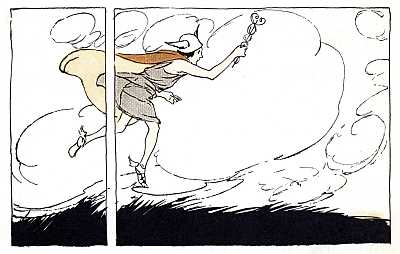
Hermes took care of the white cows after that, and on summer days he used to drive them across the blue meadows of the sky.
When the Greeks saw the white clouds running before the wind, they would say:
"It is Hermes driving his cows to pasture."
[186]

Hermes was so useful that Juno, the queen of the heavens, thought she must have a messenger, too. So she took Iris, a little sky fairy.
Iris lived up among the clouds, and played with the stars, and romped with the little winds.
At night she used to sleep in the silver cradle of the Moon.
Sometimes Apollo, the Sun, took her in his golden car. Sometimes she slipped down to earth with the rain. Sometimes she went to visit her grandfather, the gray old Sea.
[187]
Her grandfather was always glad to see her, and when she came down, he would hitch up his white sea horses and drive her over the tops of the waves. What fun that was!
Old grandfather Sea loved Iris very much, and Apollo loved her, and Juno loved her.
No one who saw her could help loving her; she was so bright and beautiful and good.
When Juno sent her down to the earth on errands, the old Sea always wanted her to stay.
But Apollo, the Sun, wanted her, too, and Juno wanted her.
At last the Sun and the Sea and the Air and the Rain all said they would make a bridge for Iris, so that[188] she might go back and forth more quickly between the earth and the sky, on the errands of Juno.
The Earth brought the colors of all her beautiful flowers—rose, and blue, and violet, and yellow, and orange, and the green of the grass.
The Sea gave silver mist.
The Clouds gave gray and gold.
The Sun himself spun the bridge out of all these colors.
Then he fastened one end of it to the sky and hung a pot of gold on the other end, to keep it from blowing away; and it is said that the pot of gold is still there in the earth at the end of the rainbow bridge.
But no one has ever found it.
[189]
[190]

[191]

[192]
[193]
Note to the Teacher. The vocabulary of this book is here rearranged for class drill. This should be given daily until the pupils are able to pronounce at least thirty words per minute either by following the columns or the lines.
In this grade children may be expected to give the reasons for the several vowel sounds herein taught, but should not be required to commit and apply phonetic rules. As the words in a column are generally in the same phonetic group, column drills tend to fix the principle there presented. But in the line drills and in the review tables children must rely upon their own knowledge of the phonetic elements.
Table I consists of monosyllabic words of not more than four letters in which a single consonant precedes a short vowel or in which a short vowel begins the word. There is a column for each vowel.
Table II contains words with two consonants final or initial or both.
Table III introduces vowels made long by final silent e.
Table IV is a mixed review with some additional words.
Table V contains long vowel digraphs and y equivalent to long i, and has a review column of forms ending in s.
Tables VI, VII, and VIII contain lists of words illustrating the remaining vowel sounds in frequent use throughout the book.
Table IX presents groups of words taught by analogy. It also illustrates c, g, and dg, followed by silent e.
Table X is a review of monosyllables with some additional words.
Table XI teaches words of two syllables with the endings ing, short y, and er; also the elision of e. Column five is largely a review.
Table XII presents three columns of words of two syllables illustrating the phonetic principles previously set forth. Column four illustrates the long vowel ending an accented syllable; column five gives final ed pronounced as d or t.
Table XIII, column one, gives a and be as prefixes and ful as a suffix; column two, silent letters; column three, contractions and possessives; column four and column five, unclassified phonetic words.
Table XIV contains unphonetic words or words but partly phonetic.
[194]
TABLE I | ||||
| sad | met | dim | box | sun |
| ax | yet | dig | fox | cup |
| bag | wet | bill | top | dug |
| cap | bell | fit | pop | puff |
| hand | web | kiss | hop | fun |
| man | nest | lid | dot | husk |
| sand | bend | hid | not | dust |
| camp | felt | lit | got | but |
| rap | send | rid | pot | must |
| bad | bent | hit | on | run |
TABLE II | ||||
| rich | drop | still | switch | things |
| ring | spun | dress | struck | banks |
| neck | flax | flop | swept | ships |
| witch | than | fresh | whish | pranks |
| rank | swim | shell | pluck | wings |
| hitch | shot | swift | drink | frogs |
| bank | thin | crept | spent | rocks |
| such | sled | stand | string | logs |
| fish | shop | speck | spring | crabs[195] |
TABLE III | ||||
| safe | these | fine | shone | tune |
| crane | here | white | those | spoke |
| plate | cave | life | stone | rode |
| state | shape | pine | hole | rope |
| spade | flame | side | woke | froze |
| vale | sale | dine | shore | rove |
| shake | lake | shine | drove | grove |
| brave | name | drive | smoke | more |
TABLE IV | ||||
| when | spade | grove | thin | yes |
| husk | shine | pranks | these | dwell |
| ring | smoke | mist | same | drive |
| must | spent | lent | banks | drove |
| skin | whish | end | tune | puff |
| shell | logs | snake | shore | here |
| witch | white | things | flame | man |
| drink | gift | melt | frogs | went |
| drops | elk | stand | pip | spring |
| thank | still | step | such | crabs |
| dress | wave | mine | dust | struck[196] |
TABLE V | ||||
| bee | tea | sail | boat | grapes |
| sweep | each | pain | goat | boats |
| three | year | rain | road | goats |
| freeze | bleat | trail | throat | snakes |
| thee | leaf | plain | cloak | shapes |
| queer | meat | wait | foam | kites |
| free | scream | pay | toad | miles |
| wheel | dream | play | roam | flows |
| feet | wheat | gray | coat | holes |
| sweet | feast | bay | soak | seas |
| need | leaves | sky | goes | years |
| green | beasts | sly | bow | grows |
| seek | clear | dry | row | tales |
| deer | grease | try | show | rains |
| deep | beads | thy | low | stones |
| feel | clean | pies | snow | times |
| week | near | lie | grow | seems |
| peek | stream | tied | grown | waves |
| sheet | heat | tried | new | skies |
| cheese | speaks | cried | knew | Greeks[197] |
TABLE VI | ||||
| far | sharp | sir | nor | burn |
| car | hard | first | for | hurt |
| dark | scar | birds | corn | turn |
| lark | stars | birch | north | burst |
| barn | marks | skirts | storm | purse |
| hark | yards | perch | horse | purr |
TABLE VII | ||||
| ball | glass | moo | true | foot |
| hall | past | shoo | flue | stood |
| small | grass | room | blew | full |
| tall | ant | root | chew | put |
| paw | fast | moose | rude | pull |
| walk | last | choose | rule | push |
TABLE VIII | ||||
| soft | air | word | cows | sour |
| toss | hair | words | town | south |
| moss | fair | worm | brown | round |
| cross | chair | work | owl | loud |
| strong | care | works | tower | wound |
| long | fare | world | flowers | hours[198] |
TABLE IX | ||||
| high | kind | old | ice | rage |
| light | mind | gold | mice | orange |
| bright | find | fold | face | hedge |
| right | grind | hold | place | bridges |
| night | child | told | peace | head |
| fright | wild | cold | prince | spread |
TABLE X | ||||
| bars | trail | shore | peace | grass |
| town | grease | shape | child | talk |
| rage | dance | swift | tight | blew |
| drink | room | watch | freeze | stood |
| struck | fair | clear | flows | birch |
| smoke | snake | soak | worm | sharp |
| spade | noise | gray | clouds | bread |
| south | spoil | world | beasts | hold |
| strong | counts | small | hitch | shine |
| grown | harp | wound | white | skirts |
| queen | quite | storm | bear | true |
| throat | waves | leaves | care | perch |
| cried | brown | hedge | cross | burst[199] |
TABLE XI | ||||
| spinning | grassy | never | feeble | Bossy |
| mumbling | woolly | summer | uncles | every |
| hunting | ferry | rivers | needles | gipsy |
| pecking | stormy | owner | castle | Bobby |
| barking | funny | sister | bottle | kippy |
| hanging | happy | whiskers | little | Jippy |
| filling | sandy | blower | purple | Jimmy |
| shaking | empty | dinner | puddles | Fanny |
| passing | ugly | gather | gentle | valley |
| shining | sorry | pitcher | beaten | lilies |
| trembling | marry | silver | golden | fairies |
| sitting | greeny | hunter | gardens | teasing |
| tacking | thirsty | otters | wooden | evening |
| living | angry | thunder | maiden | perching |
| begging | lily | farmer | given | camel |
| driving | lonely | winter | frozen | jewel |
| camping | merry | slumber | hidden | kernels |
| swimming | hurry | hither | frighten | ragged |
| growing | gently | either | happen | scolded |
| bubbling | weedy | neither | broken | floated[200] |
TABLE XII | ||||
| until | errands | snowflakes | secret | saved |
| arrows | cowslip | boatman | faded | seemed |
| billows | seaside | sunbeams | waded | turned |
| swallow | jackals | moonbeams | table | tired |
| yellow | carried | thousand | blazes | twirled |
| shadow | forests | rainbow | tigers | growled |
| hollow | princess | wampum | tulip | happened |
| maybe | hundred | housetops | roses | rubbed |
| basket | hemlock | ourselves | lady | grumbled |
| magic | insects | shepherd | music | surprised |
| flowers | forgot | wigwam | quiet | drowned |
| timid | within | merchants | giant | tangled |
| visit | himself | bonfires | baby | roared |
| sunset | window | darkness | finer | used |
| spirit | appear | strangest | wider | showed |
| ashes | indeed | playgrounds | cradle | brushed |
| voices | forget | dreamland | stories | dropped |
| daisies | outside | sun-struck | going | stretched |
| linen | herself | perhaps | open | romped |
| coral | mistake | married | Iris | slipped[201] |
TABLE XIII | ||||
| ago | knew | I've | God | fluttering |
| arise | comb | I'll | Ellen | passenger |
| around | climb | I'm | Juno | woodcutter |
| ashamed | lambs | it's | Hermes | hollyhock |
| across | lambkins | we'll | Orion | umbrellas |
| ashore | wrens | you'll | Diana | bumblebee |
| along | wrong | you've | Childe | lackaday |
| afraid | answered | you're | Jeremy | shivering |
| aboard | sword | they'll | Mercury | everything |
| among | honest | they're | Indian | everywhere |
| Apollo | autumn | didn't | suddenly | shepherdess |
| belongs | fastened | don't | overtops | elephants |
| before | fighting | who'll | different | buffaloes |
| beyond | tightly | haven't | coconut | everybody |
| because | ought | doesn't | violet | messenger |
| beneath | fought | won't | shouldn't | Rowland |
| beside | brought | ladies' | mammy's | Limberkin |
| became | taught | she's | myself | Tom Tit Tot |
| useful | naughty | there's | polite | Artemis |
| faithful | daughter | dolly's | speckled | Thursday[202] |
TABLE XIV | ||||
| son | elves | prayer | building | wonderful |
| fro | eyes | colors | together | hovering |
| sure | to-day | touched | quarrel | to-morrow |
| blood | floor | instead | eleven | shoulders |
| meant | rolled | months | dreadful | everywhere |
| heard | skeins | obeyed | feathers | blossomed |
| guess | fruit | twelve | to-night | neighbors |
| warm | built | toward | island | hastening |
| love | ribbon | beggar | monkey | steadily |
| dove | above | fortune | youngest | pictures |
| field | pearls | voyage | seasons | overhead |
| piece | forth | country | diamonds | grandfather |
| view | ready | coming | chimney | wherever |
| buy | acorn | enough | pasture | pleasant |
| folk | friend | anyway | backward | sugar cane |
| both | idly | ancient | forward | learning |
| does | ghosts | halfway | prairie | covered |
| earth | often | loving | trouble | beautiful |
| lyre | sailor | pretty | anybody | prettier |
| lose | ocean | heaven | nobody | Englishman |
[203]
This list does not include words used in Book One. The numeral before each group refers to the page on which the words first appear.
11. Childe Rowland
princess
name
Ellen
ball
12. elves
dark
tower
far
13. youngest
14. sword
things
15. country
head
speaks
16. drop
thirsty
forget
eyes
knew
18. around
each
20. dim
light
seemed
himself
hall
gold
silver
diamonds
shone
sad
21. turned
stone
golden
22. floor
free
noise
outside
fee-fi-fo-fum
blood
Englishman
fought
23. enough
bottle
24. hand
sister
left
25. Tom Tit Tot
hard
daughter
those
meant
soft
26. herself
27. spinning
mumbling
to-day
heard
spun
skeins
28. fine
eleven
months
every
year
29. anyway
everything
30. room
wheel
flax
before
goes
31. twirled
window
guess
pay
work
32. try
33. brought
34. together
hunting
queer
hole
nimmy
I'm
35. table
because
36. never
37. lambkins
grassy
banks
pranks
woolly
feet
watch
bleat
38. ferry
across
boatman
you've
purse
I'll
[204]
step
boat
39. coral
sailor
ashore
white
dig
nor
pluck
feeble
insects
stormy
40. swallow
sun-loving
summer
41. wrens
hedge
building
perching
pecking
fluttering
everywhere
42. sail
rivers
ships
clouds
sky
prettier
than
these
bridges
pretty
bow
heaven
overtops
road
earth
43. paw
woke
44. saved
life
45. honest
ax
woodcutter
stood
46. kind
sir
47. Mercury
met
49. crane
throat
bill
51. town
visit
mice
52. rich
barking
music
53. safe
54. quarrel
cloak
care
55. warm
56. ant
dove
leaf
blew
shore
58. lark
nest
field
owner
59. neighbors
uncles
60. yet
ourselves
61. shadow
piece
meat
63. grapes
sweet
hanging
still
high
don't
sour
fit
64. birds
north
south
wider
view
spread
wings
65. bark
basket
kippy
peek
maybe
funny
learning
secret
speckled
66. Jeremy
covered
growled
sly
Limberkin
dreadful
scream
dream
67. snowflakes
feathers
filling
air
they're
shaking
swift
love
we'll
[205]
kiss
true
68. hollyhock
bend
need
dolly's
tea
acorn
plate
feast
state
69. pine
valley
beautiful
needles
green
70. leaves
happened
passing
shining
71. carried
glass
72. perhaps
74. happy
75. faithful
beasts
seek
fortune
along
teasing
monkey
hurt
pain
76. tied
77. spent
box
fastened
lid
78. floated
round
rolled
magic
wherever
79. castle
gardens
merchants
built
80. showed
81. ribbon
82. whiskers
rubbed
drove
83. swim
84. mind
frogs
85. brown
sand
flows
either
86. foam
mine
past
hundred
miles
87. seaside
wooden
spade
sandy
empty
cup
rain
umbrellas
88. autumn
vale
bonfires
smoke
trail
pleasant
flowers
blazes
gray
seasons
bright
89. toss
kites
ladies'
skirts
grass
loud
90. different
hid
felt
push
strong
cold
blower
child
91. timid
afraid
coconut
shot
92. running
93. answered
elephants
tigers
94. buffaloes
deer
jackals
95. first
show
97. husk
fruit
98. top
place
both
wrong
root
string
side
99. owl
[206]
among
stand
100. does
102. camel
sugar
cane
crabs
waded
103. haven't
104. dinner
105. deep
feel
106. bumblebee
tulip
mistake
lake
107. Bobby
barn
Bossy
lackaday
who'll
shoo
drive
moo
mammy's
108. Jippy
Jimmy
logs
wet
thin
crept
dry
ki-hi
109. shivering
roam
won't
until
pip
pop
flippety
flop
ready
clear
gather
chimney
row
hop
110. kernels
sharp
yellow
small
burst
shake
steadily
backward
forward
you'll
low
111. ugly
spring
112. indeed
pitcher
gift
jewel
scolded
sorry
113. roses
pearls
114. send
Fanny
myself
115. grumbled
lady
116. polite
snake
toad
spoke
117. prince
118. surprised
married
119. sitting
evening
same
120. week
Thursday
121. bell
ring
122. bent
123. coat
trouble
witch
123. marry
yards
124. lent
horse
125. switch
126. rode
comb
128. boo-oo-oo
roared
tired
130. sale
132. to-morrow
grease
134. rage
135. greeny
bay
tacking
island
beneath
ought
aboard
drowned
ocean
billows
136. fare
passenger
voyage
sheet
137. wound
living
[207]
tune
naughty
cross
rude
tangled
spoil
138. scar
quiet
wigwam
Indian
moose
maiden
marks
snow
sled
ice
139. brave
hunter
wonderful
choose
140. sunset
end
angry
ashes
141. shell
beads
dress
142. skin
145. broken
birch
fresh
clean
brushed
146. hair
147. rainbow
faded
stars
148. forgot
neck
elk
wampum
used
spirit
shoulders
obeyed
149. belongs
ashamed
150. rocks
cave
twelve
otters
camp
foot
151. climb
hollow
middle
struck
152. dug
153. mist
storm
thunder
voices
155. peace
given
grown
tall
near
baby
taught
156. lily
ago
stories
halfway
shape
157. became
lonely
plain
prairie
158. wild
toward
159. blossomed
lilies
160. beggar
ragged
begging
161. friend
dust
lose
stream
163. bee
linen
fair
shop
buy
shouldn't
164. web
everybody
swept
finer
neither
165. worm
farmer
son
166. hours
nobody
grow
167. winter
froze
168. melt
frozen
coming
169. idly
fro
pasture
merry
housetops
sweep
shepherd
driving
hastening
[208]
within
fold
hurry
beyond
170. shine
trembling
bars
darkness
slumber
171. ghost
fairies
lit
tales
dwell
forgotten
ancient
172. quite
strangest
folk
anybody
flue
rove
gypsy
camping
grove
hither
hidden
flame
hovering
appear
sure
suddenly
puff
whish
173. daisies
overhead
dot
often
arise
there's
skies
she's
dropped
174. giant
Greeks
car
heat
arrows
sunbeams
sun-struck
gently
175. Apollo
harp
lyre
Artemis
Diana
176. pictures
moonbeams
new
Orion
177. word
instead
rid
178. hit
speck
swimming
180. Hermes
cap
errands
181. stretched
tightly
fun
184. quarreling
fighting
touched
themselves
186. useful
messenger
Juno
Iris
romped
cradle
slipped
grandfather
187. hitch
waves
188. forth
colors
violet
orange
189. soak
chew
hemlock
rank
growing
weedy
cowslip
purple
bubbling
dine
190. playgrounds
thousand
moss
lie
forests
puddles
freeze
above
191. thy
dreamland
thee
lambs
gentle
shepherdess
192. prayer
God
counts
to-night
End of the Project Gutenberg EBook of The Young and Field Literary Readers,
Book 2, by Ella Flagg Young and Walter Taylor Field
*** END OF THIS PROJECT GUTENBERG EBOOK THE YOUNG AND FIELD LITERARY ***
***** This file should be named 38412-h.htm or 38412-h.zip *****
This and all associated files of various formats will be found in:
http://www.gutenberg.org/3/8/4/1/38412/
Produced by Juliet Sutherland, Matthew Wheaton and the
Online Distributed Proofreading Team at http://www.pgdp.net
Updated editions will replace the previous one--the old editions
will be renamed.
Creating the works from public domain print editions means that no
one owns a United States copyright in these works, so the Foundation
(and you!) can copy and distribute it in the United States without
permission and without paying copyright royalties. Special rules,
set forth in the General Terms of Use part of this license, apply to
copying and distributing Project Gutenberg-tm electronic works to
protect the PROJECT GUTENBERG-tm concept and trademark. Project
Gutenberg is a registered trademark, and may not be used if you
charge for the eBooks, unless you receive specific permission. If you
do not charge anything for copies of this eBook, complying with the
rules is very easy. You may use this eBook for nearly any purpose
such as creation of derivative works, reports, performances and
research. They may be modified and printed and given away--you may do
practically ANYTHING with public domain eBooks. Redistribution is
subject to the trademark license, especially commercial
redistribution.
*** START: FULL LICENSE ***
THE FULL PROJECT GUTENBERG LICENSE
PLEASE READ THIS BEFORE YOU DISTRIBUTE OR USE THIS WORK
To protect the Project Gutenberg-tm mission of promoting the free
distribution of electronic works, by using or distributing this work
(or any other work associated in any way with the phrase "Project
Gutenberg"), you agree to comply with all the terms of the Full Project
Gutenberg-tm License (available with this file or online at
http://gutenberg.org/license).
Section 1. General Terms of Use and Redistributing Project Gutenberg-tm
electronic works
1.A. By reading or using any part of this Project Gutenberg-tm
electronic work, you indicate that you have read, understand, agree to
and accept all the terms of this license and intellectual property
(trademark/copyright) agreement. If you do not agree to abide by all
the terms of this agreement, you must cease using and return or destroy
all copies of Project Gutenberg-tm electronic works in your possession.
If you paid a fee for obtaining a copy of or access to a Project
Gutenberg-tm electronic work and you do not agree to be bound by the
terms of this agreement, you may obtain a refund from the person or
entity to whom you paid the fee as set forth in paragraph 1.E.8.
1.B. "Project Gutenberg" is a registered trademark. It may only be
used on or associated in any way with an electronic work by people who
agree to be bound by the terms of this agreement. There are a few
things that you can do with most Project Gutenberg-tm electronic works
even without complying with the full terms of this agreement. See
paragraph 1.C below. There are a lot of things you can do with Project
Gutenberg-tm electronic works if you follow the terms of this agreement
and help preserve free future access to Project Gutenberg-tm electronic
works. See paragraph 1.E below.
1.C. The Project Gutenberg Literary Archive Foundation ("the Foundation"
or PGLAF), owns a compilation copyright in the collection of Project
Gutenberg-tm electronic works. Nearly all the individual works in the
collection are in the public domain in the United States. If an
individual work is in the public domain in the United States and you are
located in the United States, we do not claim a right to prevent you from
copying, distributing, performing, displaying or creating derivative
works based on the work as long as all references to Project Gutenberg
are removed. Of course, we hope that you will support the Project
Gutenberg-tm mission of promoting free access to electronic works by
freely sharing Project Gutenberg-tm works in compliance with the terms of
this agreement for keeping the Project Gutenberg-tm name associated with
the work. You can easily comply with the terms of this agreement by
keeping this work in the same format with its attached full Project
Gutenberg-tm License when you share it without charge with others.
1.D. The copyright laws of the place where you are located also govern
what you can do with this work. Copyright laws in most countries are in
a constant state of change. If you are outside the United States, check
the laws of your country in addition to the terms of this agreement
before downloading, copying, displaying, performing, distributing or
creating derivative works based on this work or any other Project
Gutenberg-tm work. The Foundation makes no representations concerning
the copyright status of any work in any country outside the United
States.
1.E. Unless you have removed all references to Project Gutenberg:
1.E.1. The following sentence, with active links to, or other immediate
access to, the full Project Gutenberg-tm License must appear prominently
whenever any copy of a Project Gutenberg-tm work (any work on which the
phrase "Project Gutenberg" appears, or with which the phrase "Project
Gutenberg" is associated) is accessed, displayed, performed, viewed,
copied or distributed:
This eBook is for the use of anyone anywhere at no cost and with
almost no restrictions whatsoever. You may copy it, give it away or
re-use it under the terms of the Project Gutenberg License included
with this eBook or online at www.gutenberg.org
1.E.2. If an individual Project Gutenberg-tm electronic work is derived
from the public domain (does not contain a notice indicating that it is
posted with permission of the copyright holder), the work can be copied
and distributed to anyone in the United States without paying any fees
or charges. If you are redistributing or providing access to a work
with the phrase "Project Gutenberg" associated with or appearing on the
work, you must comply either with the requirements of paragraphs 1.E.1
through 1.E.7 or obtain permission for the use of the work and the
Project Gutenberg-tm trademark as set forth in paragraphs 1.E.8 or
1.E.9.
1.E.3. If an individual Project Gutenberg-tm electronic work is posted
with the permission of the copyright holder, your use and distribution
must comply with both paragraphs 1.E.1 through 1.E.7 and any additional
terms imposed by the copyright holder. Additional terms will be linked
to the Project Gutenberg-tm License for all works posted with the
permission of the copyright holder found at the beginning of this work.
1.E.4. Do not unlink or detach or remove the full Project Gutenberg-tm
License terms from this work, or any files containing a part of this
work or any other work associated with Project Gutenberg-tm.
1.E.5. Do not copy, display, perform, distribute or redistribute this
electronic work, or any part of this electronic work, without
prominently displaying the sentence set forth in paragraph 1.E.1 with
active links or immediate access to the full terms of the Project
Gutenberg-tm License.
1.E.6. You may convert to and distribute this work in any binary,
compressed, marked up, nonproprietary or proprietary form, including any
word processing or hypertext form. However, if you provide access to or
distribute copies of a Project Gutenberg-tm work in a format other than
"Plain Vanilla ASCII" or other format used in the official version
posted on the official Project Gutenberg-tm web site (www.gutenberg.org),
you must, at no additional cost, fee or expense to the user, provide a
copy, a means of exporting a copy, or a means of obtaining a copy upon
request, of the work in its original "Plain Vanilla ASCII" or other
form. Any alternate format must include the full Project Gutenberg-tm
License as specified in paragraph 1.E.1.
1.E.7. Do not charge a fee for access to, viewing, displaying,
performing, copying or distributing any Project Gutenberg-tm works
unless you comply with paragraph 1.E.8 or 1.E.9.
1.E.8. You may charge a reasonable fee for copies of or providing
access to or distributing Project Gutenberg-tm electronic works provided
that
- You pay a royalty fee of 20% of the gross profits you derive from
the use of Project Gutenberg-tm works calculated using the method
you already use to calculate your applicable taxes. The fee is
owed to the owner of the Project Gutenberg-tm trademark, but he
has agreed to donate royalties under this paragraph to the
Project Gutenberg Literary Archive Foundation. Royalty payments
must be paid within 60 days following each date on which you
prepare (or are legally required to prepare) your periodic tax
returns. Royalty payments should be clearly marked as such and
sent to the Project Gutenberg Literary Archive Foundation at the
address specified in Section 4, "Information about donations to
the Project Gutenberg Literary Archive Foundation."
- You provide a full refund of any money paid by a user who notifies
you in writing (or by e-mail) within 30 days of receipt that s/he
does not agree to the terms of the full Project Gutenberg-tm
License. You must require such a user to return or
destroy all copies of the works possessed in a physical medium
and discontinue all use of and all access to other copies of
Project Gutenberg-tm works.
- You provide, in accordance with paragraph 1.F.3, a full refund of any
money paid for a work or a replacement copy, if a defect in the
electronic work is discovered and reported to you within 90 days
of receipt of the work.
- You comply with all other terms of this agreement for free
distribution of Project Gutenberg-tm works.
1.E.9. If you wish to charge a fee or distribute a Project Gutenberg-tm
electronic work or group of works on different terms than are set
forth in this agreement, you must obtain permission in writing from
both the Project Gutenberg Literary Archive Foundation and Michael
Hart, the owner of the Project Gutenberg-tm trademark. Contact the
Foundation as set forth in Section 3 below.
1.F.
1.F.1. Project Gutenberg volunteers and employees expend considerable
effort to identify, do copyright research on, transcribe and proofread
public domain works in creating the Project Gutenberg-tm
collection. Despite these efforts, Project Gutenberg-tm electronic
works, and the medium on which they may be stored, may contain
"Defects," such as, but not limited to, incomplete, inaccurate or
corrupt data, transcription errors, a copyright or other intellectual
property infringement, a defective or damaged disk or other medium, a
computer virus, or computer codes that damage or cannot be read by
your equipment.
1.F.2. LIMITED WARRANTY, DISCLAIMER OF DAMAGES - Except for the "Right
of Replacement or Refund" described in paragraph 1.F.3, the Project
Gutenberg Literary Archive Foundation, the owner of the Project
Gutenberg-tm trademark, and any other party distributing a Project
Gutenberg-tm electronic work under this agreement, disclaim all
liability to you for damages, costs and expenses, including legal
fees. YOU AGREE THAT YOU HAVE NO REMEDIES FOR NEGLIGENCE, STRICT
LIABILITY, BREACH OF WARRANTY OR BREACH OF CONTRACT EXCEPT THOSE
PROVIDED IN PARAGRAPH F3. YOU AGREE THAT THE FOUNDATION, THE
TRADEMARK OWNER, AND ANY DISTRIBUTOR UNDER THIS AGREEMENT WILL NOT BE
LIABLE TO YOU FOR ACTUAL, DIRECT, INDIRECT, CONSEQUENTIAL, PUNITIVE OR
INCIDENTAL DAMAGES EVEN IF YOU GIVE NOTICE OF THE POSSIBILITY OF SUCH
DAMAGE.
1.F.3. LIMITED RIGHT OF REPLACEMENT OR REFUND - If you discover a
defect in this electronic work within 90 days of receiving it, you can
receive a refund of the money (if any) you paid for it by sending a
written explanation to the person you received the work from. If you
received the work on a physical medium, you must return the medium with
your written explanation. The person or entity that provided you with
the defective work may elect to provide a replacement copy in lieu of a
refund. If you received the work electronically, the person or entity
providing it to you may choose to give you a second opportunity to
receive the work electronically in lieu of a refund. If the second copy
is also defective, you may demand a refund in writing without further
opportunities to fix the problem.
1.F.4. Except for the limited right of replacement or refund set forth
in paragraph 1.F.3, this work is provided to you 'AS-IS' WITH NO OTHER
WARRANTIES OF ANY KIND, EXPRESS OR IMPLIED, INCLUDING BUT NOT LIMITED TO
WARRANTIES OF MERCHANTIBILITY OR FITNESS FOR ANY PURPOSE.
1.F.5. Some states do not allow disclaimers of certain implied
warranties or the exclusion or limitation of certain types of damages.
If any disclaimer or limitation set forth in this agreement violates the
law of the state applicable to this agreement, the agreement shall be
interpreted to make the maximum disclaimer or limitation permitted by
the applicable state law. The invalidity or unenforceability of any
provision of this agreement shall not void the remaining provisions.
1.F.6. INDEMNITY - You agree to indemnify and hold the Foundation, the
trademark owner, any agent or employee of the Foundation, anyone
providing copies of Project Gutenberg-tm electronic works in accordance
with this agreement, and any volunteers associated with the production,
promotion and distribution of Project Gutenberg-tm electronic works,
harmless from all liability, costs and expenses, including legal fees,
that arise directly or indirectly from any of the following which you do
or cause to occur: (a) distribution of this or any Project Gutenberg-tm
work, (b) alteration, modification, or additions or deletions to any
Project Gutenberg-tm work, and (c) any Defect you cause.
Section 2. Information about the Mission of Project Gutenberg-tm
Project Gutenberg-tm is synonymous with the free distribution of
electronic works in formats readable by the widest variety of computers
including obsolete, old, middle-aged and new computers. It exists
because of the efforts of hundreds of volunteers and donations from
people in all walks of life.
Volunteers and financial support to provide volunteers with the
assistance they need, are critical to reaching Project Gutenberg-tm's
goals and ensuring that the Project Gutenberg-tm collection will
remain freely available for generations to come. In 2001, the Project
Gutenberg Literary Archive Foundation was created to provide a secure
and permanent future for Project Gutenberg-tm and future generations.
To learn more about the Project Gutenberg Literary Archive Foundation
and how your efforts and donations can help, see Sections 3 and 4
and the Foundation web page at http://www.pglaf.org.
Section 3. Information about the Project Gutenberg Literary Archive
Foundation
The Project Gutenberg Literary Archive Foundation is a non profit
501(c)(3) educational corporation organized under the laws of the
state of Mississippi and granted tax exempt status by the Internal
Revenue Service. The Foundation's EIN or federal tax identification
number is 64-6221541. Its 501(c)(3) letter is posted at
http://pglaf.org/fundraising. Contributions to the Project Gutenberg
Literary Archive Foundation are tax deductible to the full extent
permitted by U.S. federal laws and your state's laws.
The Foundation's principal office is located at 4557 Melan Dr. S.
Fairbanks, AK, 99712., but its volunteers and employees are scattered
throughout numerous locations. Its business office is located at
809 North 1500 West, Salt Lake City, UT 84116, (801) 596-1887, email
business@pglaf.org. Email contact links and up to date contact
information can be found at the Foundation's web site and official
page at http://pglaf.org
For additional contact information:
Dr. Gregory B. Newby
Chief Executive and Director
gbnewby@pglaf.org
Section 4. Information about Donations to the Project Gutenberg
Literary Archive Foundation
Project Gutenberg-tm depends upon and cannot survive without wide
spread public support and donations to carry out its mission of
increasing the number of public domain and licensed works that can be
freely distributed in machine readable form accessible by the widest
array of equipment including outdated equipment. Many small donations
($1 to $5,000) are particularly important to maintaining tax exempt
status with the IRS.
The Foundation is committed to complying with the laws regulating
charities and charitable donations in all 50 states of the United
States. Compliance requirements are not uniform and it takes a
considerable effort, much paperwork and many fees to meet and keep up
with these requirements. We do not solicit donations in locations
where we have not received written confirmation of compliance. To
SEND DONATIONS or determine the status of compliance for any
particular state visit http://pglaf.org
While we cannot and do not solicit contributions from states where we
have not met the solicitation requirements, we know of no prohibition
against accepting unsolicited donations from donors in such states who
approach us with offers to donate.
International donations are gratefully accepted, but we cannot make
any statements concerning tax treatment of donations received from
outside the United States. U.S. laws alone swamp our small staff.
Please check the Project Gutenberg Web pages for current donation
methods and addresses. Donations are accepted in a number of other
ways including checks, online payments and credit card donations.
To donate, please visit: http://pglaf.org/donate
Section 5. General Information About Project Gutenberg-tm electronic
works.
Professor Michael S. Hart is the originator of the Project Gutenberg-tm
concept of a library of electronic works that could be freely shared
with anyone. For thirty years, he produced and distributed Project
Gutenberg-tm eBooks with only a loose network of volunteer support.
Project Gutenberg-tm eBooks are often created from several printed
editions, all of which are confirmed as Public Domain in the U.S.
unless a copyright notice is included. Thus, we do not necessarily
keep eBooks in compliance with any particular paper edition.
Most people start at our Web site which has the main PG search facility:
http://www.gutenberg.org
This Web site includes information about Project Gutenberg-tm,
including how to make donations to the Project Gutenberg Literary
Archive Foundation, how to help produce our new eBooks, and how to
subscribe to our email newsletter to hear about new eBooks.